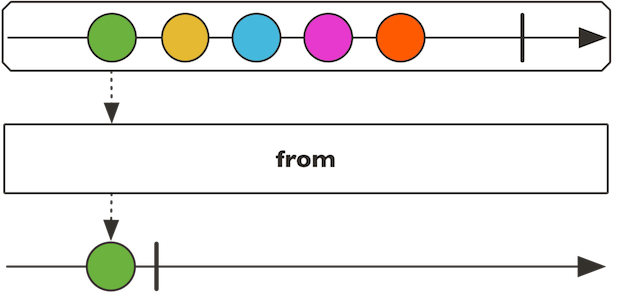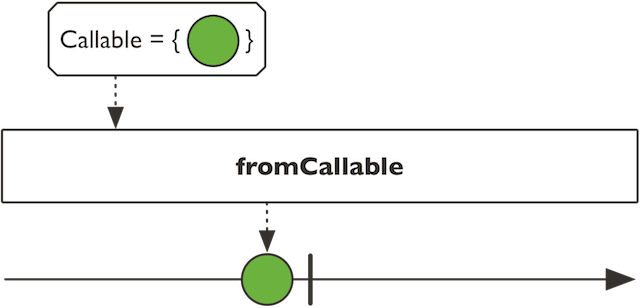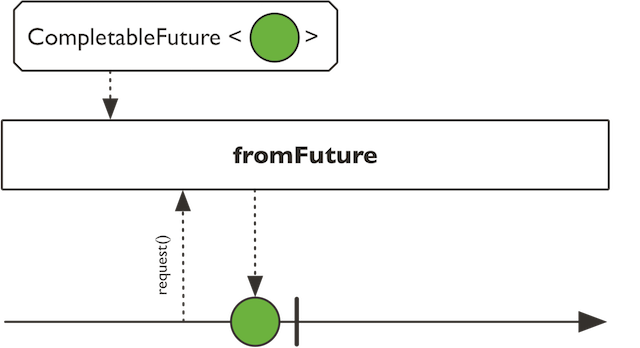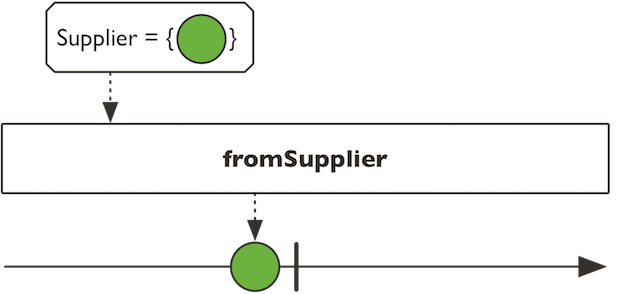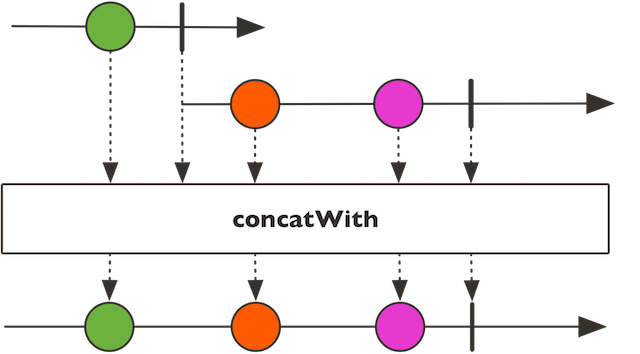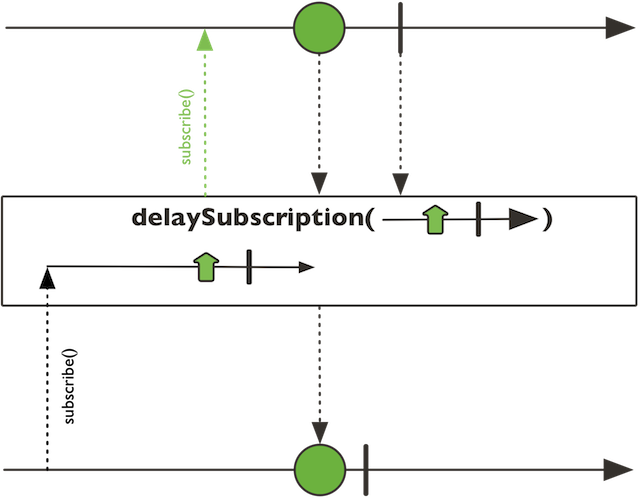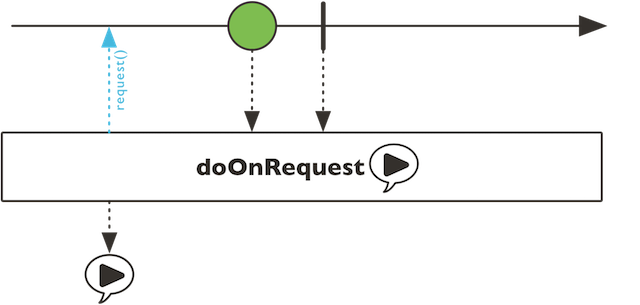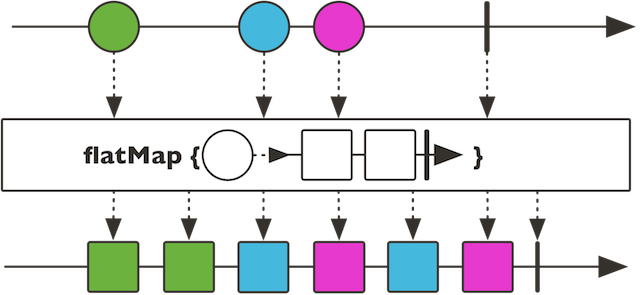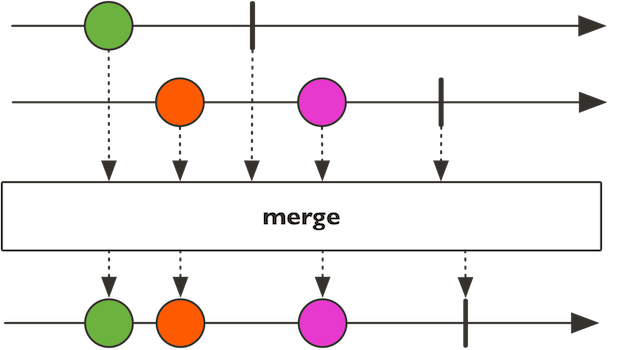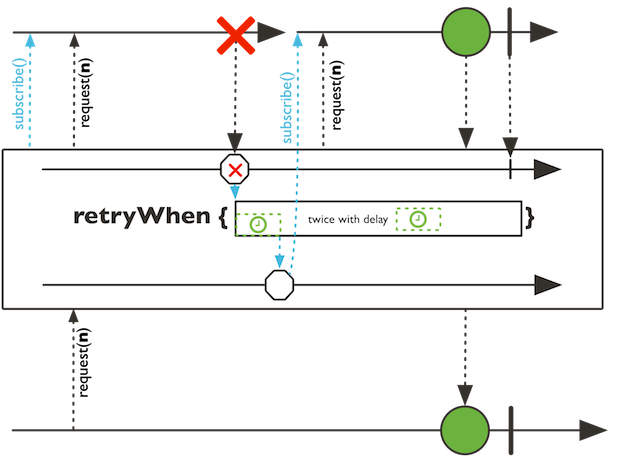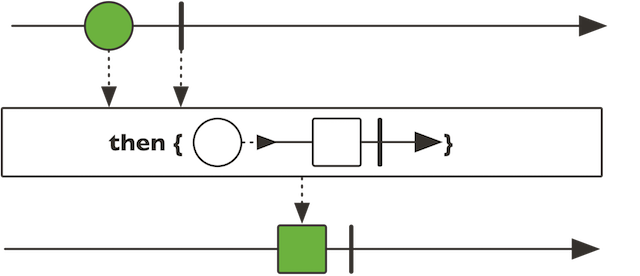- java.lang.Object
-
- reactor.core.publisher.Mono<T>
-
- Type Parameters:
T- the type of the single value of this class
- All Implemented Interfaces:
- Publisher<T>
- Direct Known Subclasses:
- MonoProcessor, MonoSource
public abstract class Mono<T> extends Object implements Publisher<T>
A Reactive StreamsPublisherwith basic rx operators that completes successfully by emitting an element, or with an error.
The rx operators will offer aliases for input
Monotype to preserve the "at most one" property of the resultingMono. For instanceflatMapreturns aMono, while there is aflatMapMany(java.util.function.Function<? super T, ? extends org.reactivestreams.Publisher<? extends R>>)alias with possibly more than 1 emission.Mono<Void>should be used forPublisherthat just completes without any value.It is intended to be used in implementations and return types, input parameters should keep using raw
Publisheras much as possible.Note that using state in the
java.util.function/ lambdas used within Mono operators should be avoided, as these may be shared between severalSubscribers.- Author:
- Sebastien Deleuze, Stephane Maldini, David Karnok
- See Also:
Flux
-
-
Constructor Summary
Constructors Constructor and Description Mono()
-
Method Summary
All Methods Static Methods Instance Methods Concrete Methods Deprecated Methods Modifier and Type Method and Description <T2> Mono<Tuple2<T,T2>>and(Function<T,Mono<? extends T2>> rightGenerator)Wait for the result from this mono, use it to create a second mono via the providedrightGeneratorfunction and combine both results into aTuple2.<T2,O> Mono<O>and(Function<T,Mono<? extends T2>> rightGenerator, BiFunction<T,T2,O> combinator)Wait for the result from this mono, use it to create a second mono via the providedrightGeneratorfunction and combine both results into an arbitraryOobject, as defined by the providedcombinatorfunction.<T2> Mono<Tuple2<T,T2>>and(Mono<? extends T2> other)Combine the result from this mono and another into aTuple2.<T2,O> Mono<O>and(Mono<? extends T2> other, BiFunction<? super T,? super T2,? extends O> combinator)Combine the result from this mono and another into an arbitraryOobject, as defined by the providedcombinatorfunction.<P> Pas(Function<? super Mono<T>,P> transformer)Transform thisMonointo a target type.Mono<T>awaitOnSubscribe()Intercepts the onSubscribe call and makes sure calls to Subscription methods only happen after the child Subscriber has returned from its onSubscribe method.Tblock()Block until a next signal is received, will return null if onComplete, T if onNext, throw a Exceptions.DownstreamException if checked error or origin RuntimeException if unchecked.Tblock(Duration timeout)Block until a next signal is received, will return null if onComplete, T if onNext, throw a Exceptions.DownstreamException if checked error or origin RuntimeException if unchecked.TblockMillis(long timeout)Deprecated.use theDurationbased variants instead, will be removed in 3.1.0Mono<T>cache()Turn thisMonointo a hot source and cache last emitted signals for furtherSubscriber.Mono<T>cancelOn(Scheduler scheduler)<E> Mono<E>cast(Class<E> clazz)Cast the currentMonoproduced type into a target produced type.Mono<T>checkpoint()Activate assembly tracing for this particularMono, in case of an error upstream of the checkpoint.Mono<T>checkpoint(String description)Activate assembly tracing for this particularMonoand give it a description that will be reflected in the assembly traceback, in case of an error upstream of the checkpoint.<V> Mono<V>compose(Function<? super Mono<T>,? extends Publisher<V>> transformer)Flux<T>concatWith(Publisher<? extends T> other)static <T> Mono<T>create(Consumer<MonoSink<T>> callback)Creates a deferred emitter that can be used with callback-based APIs to signal at most one value, a complete or an error signal.Mono<T>defaultIfEmpty(T defaultV)Provide a default unique value if this mono is completed without any datastatic <T> Mono<T>defer(Supplier<? extends Mono<? extends T>> supplier)Create aMonoprovider that willsupplya targetMonoto subscribe to for eachSubscriberdownstream.static Mono<Long>delay(Duration duration)Create a Mono which delays an onNext signal ofdurationof given unit and complete on the global timer.static Mono<Long>delay(Duration duration, Scheduler timer)Create a Mono which delays an onNext signal by a givendurationand completes.Mono<T>delayElement(Duration delay)Delay thisFluxelement (Subscriber.onNext(T)signal) by a given duration.Mono<T>delayElement(Duration delay, Scheduler timer)Mono<T>delayElementMillis(long delay)Deprecated.use theDurationbased variants instead, will be removed in 3.1.0Mono<T>delayElementMillis(long delay, TimedScheduler timer)Deprecated.use theDurationbased variants instead, will be removed in 3.1.0static Mono<Long>delayMillis(long duration)Deprecated.use theDurationbased variants instead, will be removed in 3.1.0static Mono<Long>delayMillis(long duration, TimedScheduler timer)Deprecated.use theDurationbased variants instead, will be removed in 3.1.0Mono<T>delaySubscription(Duration delay)Delay thesubscriptionto thisMonosource until the given period elapses.Mono<T>delaySubscription(Duration delay, Scheduler timer)<U> Mono<T>delaySubscription(Publisher<U> subscriptionDelay)Mono<T>delaySubscriptionMillis(long delay)Deprecated.use theDurationbased variants instead, will be removed in 3.1.0Mono<T>delaySubscriptionMillis(long delay, TimedScheduler timer)Deprecated.use theDurationbased variants instead, will be removed in 3.1.0<X> Mono<X>dematerialize()Mono<T>doAfterTerminate(BiConsumer<? super T,Throwable> afterTerminate)Triggered after theMonoterminates, either by completing downstream successfully or with an error.Mono<T>doFinally(Consumer<SignalType> onFinally)Triggering aftertheMonoterminates for any reason, including cancellation.Mono<T>doOnCancel(Runnable onCancel)Triggered when theMonois cancelled.Mono<T>doOnEach(Consumer<? super Signal<T>> signalConsumer)Triggers side-effects when theMonoemits an item, fails with an error or completes successfully.<E extends Throwable>
Mono<T>doOnError(Class<E> exceptionType, Consumer<? super E> onError)Triggered when theMonocompletes with an error matching the given exception type.Mono<T>doOnError(Consumer<? super Throwable> onError)Triggered when theMonocompletes with an error.Mono<T>doOnError(Predicate<? super Throwable> predicate, Consumer<? super Throwable> onError)Triggered when theMonocompletes with an error matching the given exception.Mono<T>doOnNext(Consumer<? super T> onNext)Triggered when theMonoemits a data successfully.Mono<T>doOnRequest(LongConsumer consumer)Mono<T>doOnSubscribe(Consumer<? super Subscription> onSubscribe)Triggered when theMonois subscribed.Mono<T>doOnSuccess(Consumer<? super T> onSuccess)Triggered when theMonocompletes successfully.Mono<T>doOnTerminate(BiConsumer<? super T,Throwable> onTerminate)Triggered when theMonoterminates, either by completing successfully or with an error.Mono<Tuple2<Long,T>>elapsed()Mono<Tuple2<Long,T>>elapsed(Scheduler scheduler)Mono<Tuple2<Long,T>>elapsed(TimedScheduler scheduler)Deprecated.static <T> Mono<T>empty()Create aMonothat completes without emitting any item.static <T> Mono<Void>empty(Publisher<T> source)Create a newMonothat ignores onNext (dropping them) and only react on Completion signal.static <T> Mono<T>error(Throwable error)Create aMonothat completes with the specified error immediately after onSubscribe.Mono<T>filter(Predicate<? super T> tester)Test the result if any of thisMonoand replay it if predicate returns true.Mono<T>filterWhen(Function<? super T,? extends Publisher<Boolean>> asyncPredicate)If thisMonois valued, test the value asynchronously using a generatedPublisher<Boolean>test.static <T> Mono<T>first(Iterable<? extends Mono<? extends T>> monos)Pick the first result coming from any of the given monos and populate a new Mono.static <T> Mono<T>first(Mono<? extends T>... monos)Pick the first result coming from any of the given monos and populate a new Mono.<R> Flux<R>flatMap(Function<? super T,? extends Publisher<? extends R>> mapper)Deprecated.will change signature and behavior in 3.1 to reflect currentthen(Function). flatMap will be renamedflatMapMany(Function), so use that instead.<R> Flux<R>flatMap(Function<? super T,? extends Publisher<? extends R>> mapperOnNext, Function<Throwable,? extends Publisher<? extends R>> mapperOnError, Supplier<? extends Publisher<? extends R>> mapperOnComplete)Deprecated.will change signature and behavior in 3.1 to reflect currentthen(Function). flatMap will be renamedflatMapMany(Function, Function, Supplier), so use that instead.<R> Flux<R>flatMapIterable(Function<? super T,? extends Iterable<? extends R>> mapper)<R> Flux<R>flatMapMany(Function<? super T,? extends Publisher<? extends R>> mapper)<R> Flux<R>flatMapMany(Function<? super T,? extends Publisher<? extends R>> mapperOnNext, Function<? super Throwable,? extends Publisher<? extends R>> mapperOnError, Supplier<? extends Publisher<? extends R>> mapperOnComplete)Flux<T>flux()static <T> Mono<T>from(Publisher<? extends T> source)static <T> Mono<T>fromCallable(Callable<? extends T> supplier)static <T> Mono<T>fromCompletionStage(CompletionStage<? extends T> completionStage)static <I> Mono<I>fromDirect(Publisher<? extends I> source)static <T> Mono<T>fromFuture(CompletableFuture<? extends T> future)static Mono<Void>fromRunnable(Runnable runnable)Create aMonoonly producing a completion signal after using the given runnable.static <T> Mono<T>fromSupplier(Supplier<? extends T> supplier)<R> Mono<R>handle(BiConsumer<? super T,SynchronousSink<R>> handler)Handle the items emitted by thisMonoby calling a biconsumer with the output sink for each onNext.Mono<Boolean>hasElement()Emit a single boolean true if thisMonohas an element.Mono<T>hide()Hides the identity of thisMonoinstance.Mono<T>ignoreElement()Ignores onNext signal (dropping it) and only reacts on termination.static <T> Mono<T>ignoreElements(Publisher<T> source)Create a newMonothat ignores onNext (dropping them) and only react on Completion signal.static <T> Mono<T>just(T data)Create a newMonothat emits the specified item.static <T> Mono<T>justOrEmpty(Optional<? extends T> data)Create a newMonothat emits the specified item ifOptional.isPresent()otherwise only emits onComplete.static <T> Mono<T>justOrEmpty(T data)Create a newMonothat emits the specified item if non null otherwise only emits onComplete.Mono<T>log()Observe all Reactive Streams signals and useLoggersupport to handle trace implementation.Mono<T>log(String category)Observe all Reactive Streams signals and useLoggersupport to handle trace implementation.Mono<T>log(String category, Level level, boolean showOperatorLine, SignalType... options)Observe Reactive Streams signals matching the passed filteroptionsand useLoggersupport to handle trace implementation.Mono<T>log(String category, Level level, SignalType... options)Observe Reactive Streams signals matching the passed flagsoptionsand useLoggersupport to handle trace implementation.<R> Mono<R>map(Function<? super T,? extends R> mapper)Transform the item emitted by thisMonoby applying a function to item emitted.<E extends Throwable>
Mono<T>mapError(Class<E> type, Function<? super E,? extends Throwable> mapper)Deprecated.useonErrorMap(java.util.function.Function<? super java.lang.Throwable, ? extends java.lang.Throwable>)instead. Will be removed in 3.1.0.Mono<T>mapError(Function<Throwable,? extends Throwable> mapper)Deprecated.useonErrorMap(java.util.function.Function<? super java.lang.Throwable, ? extends java.lang.Throwable>)instead. Will be removed in 3.1.0.Mono<T>mapError(Predicate<? super Throwable> predicate, Function<? super Throwable,? extends Throwable> mapper)Deprecated.useonErrorMap(java.util.function.Function<? super java.lang.Throwable, ? extends java.lang.Throwable>)instead. Will be removed in 3.1.0.Mono<Signal<T>>materialize()Transform the incoming onNext, onError and onComplete signals intoSignal.Flux<T>mergeWith(Publisher<? extends T> other)static <T> Mono<T>never()Return aMonothat will never signal any data, error or completion signal.<U> Mono<U>ofType(Class<U> clazz)Evaluate the accepted value against the givenClasstype.protected static <T> Mono<T>onAssembly(Mono<T> source)<E extends Throwable>
Mono<T>onErrorMap(Class<E> type, Function<? super E,? extends Throwable> mapper)Transform the error emitted by thisMonoby applying a function if the error matches the given type, otherwise let the error flow.Mono<T>onErrorMap(Function<? super Throwable,? extends Throwable> mapper)Transform the error emitted by thisMonoby applying a function.Mono<T>onErrorMap(Predicate<? super Throwable> predicate, Function<? super Throwable,? extends Throwable> mapper)Transform the error emitted by thisMonoby applying a function if the error matches the given predicate, otherwise let the error flow.<E extends Throwable>
Mono<T>onErrorResume(Class<E> type, Function<? super E,? extends Mono<? extends T>> fallback)Subscribe to a returned fallback publisher when an error matching the given type occurs.Mono<T>onErrorResume(Function<? super Throwable,? extends Mono<? extends T>> fallback)Subscribe to a returned fallback publisher when any error occurs.Mono<T>onErrorResume(Predicate<? super Throwable> predicate, Function<? super Throwable,? extends Mono<? extends T>> fallback)$ * Subscribe to a returned fallback publisher when an error matching the given predicate occurs.<E extends Throwable>
Mono<T>onErrorReturn(Class<E> type, T fallbackValue)Simply emit a captured fallback value when an error of the specified type is observed on thisMono.<E extends Throwable>
Mono<T>onErrorReturn(Predicate<? super Throwable> predicate, T fallbackValue)Simply emit a captured fallback value when an error matching the given predicate is observed on thisMono.Mono<T>onErrorReturn(T fallback)Simply emit a captured fallback value when any error is observed on thisMono.Mono<T>onTerminateDetach()Detaches the both the childSubscriberand theSubscriptionon termination or cancellation.Mono<T>or(Mono<? extends T> other)Emit the any of the result from this mono or from the given mono<E extends Throwable>
Mono<T>otherwise(Class<E> type, Function<? super E,? extends Mono<? extends T>> fallback)Deprecated.UseonErrorResume(Class, Function)instead. Will be removed in 3.1.0.Mono<T>otherwise(Function<? super Throwable,? extends Mono<? extends T>> fallback)Deprecated.UseonErrorResume(Function)} instead. Will be removed in 3.1.0.Mono<T>otherwise(Predicate<? super Throwable> predicate, Function<? super Throwable,? extends Mono<? extends T>> fallback)Deprecated.UseonErrorResume(Predicate, Function)instead. Will be removed in 3.1.0.Mono<T>otherwiseIfEmpty(Mono<? extends T> alternate)Deprecated.UseswitchIfEmpty(reactor.core.publisher.Mono<? extends T>)instead. Will be removed in 3.1.0.<E extends Throwable>
Mono<T>otherwiseReturn(Class<E> type, T fallbackValue)Deprecated.useonErrorReturn(Class, Object)instead. Will be removed in 3.1.0.<E extends Throwable>
Mono<T>otherwiseReturn(Predicate<? super Throwable> predicate, T fallbackValue)Deprecated.useonErrorReturn(Predicate, Object)instead. Will be removed in 3.1.0.Mono<T>otherwiseReturn(T fallback)Deprecated.useonErrorReturn(Object)instead. Will be removed in 3.1.0.<R> Mono<R>publish(Function<? super Mono<T>,? extends Mono<? extends R>> transform)Shares aMonofor the duration of a function that may transform it and consume it as many times as necessary without causing multiple subscriptions to the upstream.Mono<T>publishOn(Scheduler scheduler)Run onNext, onComplete and onError on a suppliedSchedulerFlux<T>repeat()Repeatedly subscribe to the source completion of the previous subscription.Flux<T>repeat(BooleanSupplier predicate)Repeatedly subscribe to the source if the predicate returns true after completion of the previous subscription.Flux<T>repeat(long numRepeat)Repeatedly subscribe to the source if the predicate returns true after completion of the previous subscription.Flux<T>repeat(long numRepeat, BooleanSupplier predicate)Repeatedly subscribe to the source if the predicate returns true after completion of the previous subscription.Flux<T>repeatWhen(Function<Flux<Long>,? extends Publisher<?>> whenFactory)Repeatedly subscribe to thisMonowhen a companion sequence signals a number of emitted elements in response to the flux completion signal.Mono<T>repeatWhenEmpty(Function<Flux<Long>,? extends Publisher<?>> repeatFactory)Repeatedly subscribe to thisMonountil there is an onNext signal when a companion sequence signals a number of emitted elements.Mono<T>repeatWhenEmpty(int maxRepeat, Function<Flux<Long>,? extends Publisher<?>> repeatFactory)Repeatedly subscribe to thisMonountil there is an onNext signal when a companion sequence signals a number of emitted elements.Mono<T>retry()Re-subscribes to thisMonosequence if it signals any error either indefinitely.Mono<T>retry(long numRetries)Re-subscribes to thisMonosequence if it signals any error either indefinitely or a fixed number of times.Mono<T>retry(long numRetries, Predicate<Throwable> retryMatcher)Mono<T>retry(Predicate<Throwable> retryMatcher)Mono<T>retryWhen(Function<Flux<Throwable>,? extends Publisher<?>> whenFactory)static <T> Mono<Boolean>sequenceEqual(Publisher<? extends T> source1, Publisher<? extends T> source2)Returns a Mono that emits a Boolean value that indicates whether two Publisher sequences are the same by comparing the items emitted by each Publisher pairwise.static <T> Mono<Boolean>sequenceEqual(Publisher<? extends T> source1, Publisher<? extends T> source2, BiPredicate<? super T,? super T> isEqual)Returns a Mono that emits a Boolean value that indicates whether two Publisher sequences are the same by comparing the items emitted by each Publisher pairwise based on the results of a specified equality function.static <T> Mono<Boolean>sequenceEqual(Publisher<? extends T> source1, Publisher<? extends T> source2, BiPredicate<? super T,? super T> isEqual, int bufferSize)Returns a Mono that emits a Boolean value that indicates whether two Publisher sequences are the same by comparing the items emitted by each Publisher pairwise based on the results of a specified equality function.MonoProcessor<T>subscribe()Start the chain and request unbounded demand.Disposablesubscribe(Consumer<? super T> consumer)Disposablesubscribe(Consumer<? super T> consumer, Consumer<? super Throwable> errorConsumer)Disposablesubscribe(Consumer<? super T> consumer, Consumer<? super Throwable> errorConsumer, Runnable completeConsumer)Disposablesubscribe(Consumer<? super T> consumer, Consumer<? super Throwable> errorConsumer, Runnable completeConsumer, Consumer<? super Subscription> subscriptionConsumer)Mono<T>subscribeOn(Scheduler scheduler)<E extends Subscriber<? super T>>
EsubscribeWith(E subscriber)Subscribe theMonowith the givneSubscriberand return it.Mono<T>switchIfEmpty(Mono<? extends T> alternate)Provide an alternativeMonoif this mono is completed without dataMono<Void>then()Return aMono<Void>which only replays complete and error signals from thisMono.<R> Mono<R>then(Function<? super T,? extends Mono<? extends R>> transformer)<V> Mono<V>then(Mono<V> other)Ignore element from thisMonoand transform its completion signal into the emission and completion signal of a providedMono<V>.<V> Mono<V>then(Supplier<? extends Mono<V>> sourceSupplier)Deprecated.removed in 3.1, usethen(Mono)withdefer(java.util.function.Supplier<? extends reactor.core.publisher.Mono<? extends T>>). The competing overload was causing confusion and the generic was not symmetric withthen(Mono).Mono<Void>thenEmpty(Publisher<Void> other)Return aMono<Void>that waits for thisMonoto complete then for a suppliedPublisher<Void>to also complete.<V> Flux<V>thenMany(Publisher<V> other)Ignore element from this mono and transform the completion signal into aFlux<V>that will emit elements from the providedPublisher.<V> Flux<V>thenMany(Supplier<? extends Publisher<V>> afterSupplier)Deprecated.removed in 3.1, usethenMany(Publisher)withdefer(java.util.function.Supplier<? extends reactor.core.publisher.Mono<? extends T>>). The competing overload was called unnecessary by extended feedback and aligns with removing of Supplier of Publisher aliases elsewhere.Mono<T>timeout(Duration timeout)Signal aTimeoutExceptionin case an item doesn't arrive before the given period.Mono<T>timeout(Duration timeout, Mono<? extends T> fallback)Switch to a fallbackMonoin case an item doesn't arrive before the given period.Mono<T>timeout(Duration timeout, Mono<? extends T> fallback, Scheduler timer)Switch to a fallbackMonoin case an item doesn't arrive before the given period.Mono<T>timeout(Duration timeout, Scheduler timer)Signal aTimeoutExceptionerror in case an item doesn't arrive before the given period.<U> Mono<T>timeout(Publisher<U> firstTimeout)Signal aTimeoutExceptionin case the item from thisMonohas not been emitted before the givenPublisheremits.<U> Mono<T>timeout(Publisher<U> firstTimeout, Mono<? extends T> fallback)Mono<T>timeoutMillis(long timeout)Deprecated.use theDurationbased variants instead, will be removed in 3.1.0Mono<T>timeoutMillis(long timeout, Mono<? extends T> fallback)Deprecated.use theDurationbased variants instead, will be removed in 3.1.0Mono<T>timeoutMillis(long timeout, Mono<? extends T> fallback, TimedScheduler timer)Deprecated.use theDurationbased variants instead, will be removed in 3.1.0Mono<T>timeoutMillis(long timeout, TimedScheduler timer)Deprecated.use theDurationbased variants instead, will be removed in 3.1.0Mono<Tuple2<Long,T>>timestamp()Mono<Tuple2<Long,T>>timestamp(Scheduler scheduler)Mono<Tuple2<Long,T>>timestamp(TimedScheduler scheduler)Deprecated.CompletableFuture<T>toFuture()Transform thisMonointo aCompletableFuturecompleting on onNext or onComplete and failing on onError.StringtoString()<V> Mono<V>transform(Function<? super Mono<T>,? extends Publisher<V>> transformer)Mono<T>untilOther(Publisher<?> anyPublisher)Subscribe to this Mono and another Publisher, which will be used as a trigger for the emission of this Mono's element.Mono<T>untilOtherDelayError(Publisher<?> anyPublisher)Subscribe to this Mono and another Publisher, which will be used as a trigger for the emission of this Mono's element, mapped through a provided function.static <T,D> Mono<T>using(Callable<? extends D> resourceSupplier, Function<? super D,? extends Mono<? extends T>> sourceSupplier, Consumer<? super D> resourceCleanup)Uses a resource, generated by a supplier for each individual Subscriber, while streaming the value from a Mono derived from the same resource and makes sure the resource is released if the sequence terminates or the Subscriber cancels.static <T,D> Mono<T>using(Callable<? extends D> resourceSupplier, Function<? super D,? extends Mono<? extends T>> sourceSupplier, Consumer<? super D> resourceCleanup, boolean eager)Uses a resource, generated by a supplier for each individual Subscriber, while streaming the value from a Mono derived from the same resource and makes sure the resource is released if the sequence terminates or the Subscriber cancels.static <R> Mono<R>when(Function<? super Object[],? extends R> combinator, Mono<?>... monos)Aggregate given monos into a new a Mono that will be fulfilled when all of the given Monos have been fulfilled.static <R> Mono<R>when(Iterable<? extends Mono<?>> monos, Function<? super Object[],? extends R> combinator)Aggregate given monos into a new a Mono that will be fulfilled when all of the given Monos have been fulfilled.static Mono<Void>when(Iterable<? extends Publisher<Void>> sources)Aggregate given void publishers into a new a Mono that will be fulfilled when all of the given Monos have been fulfilled.static <T1,T2> Mono<Tuple2<T1,T2>>when(Mono<? extends T1> p1, Mono<? extends T2> p2)Merge given monos into a new a Mono that will be fulfilled when all of the given Monos have been fulfilled.static <T1,T2,O> Mono<O>when(Mono<? extends T1> p1, Mono<? extends T2> p2, BiFunction<? super T1,? super T2,? extends O> combinator)Merge given monos into a new a Mono that will be fulfilled when all of the given Monos have been fulfilled.static <T1,T2,T3> Mono<Tuple3<T1,T2,T3>>when(Mono<? extends T1> p1, Mono<? extends T2> p2, Mono<? extends T3> p3)Merge given monos into a new a Mono that will be fulfilled when all of the given Monos have been fulfilled.static <T1,T2,T3,T4>
Mono<Tuple4<T1,T2,T3,T4>>when(Mono<? extends T1> p1, Mono<? extends T2> p2, Mono<? extends T3> p3, Mono<? extends T4> p4)Merge given monos into a new a Mono that will be fulfilled when all of the given Monos have been fulfilled.static <T1,T2,T3,T4,T5>
Mono<Tuple5<T1,T2,T3,T4,T5>>when(Mono<? extends T1> p1, Mono<? extends T2> p2, Mono<? extends T3> p3, Mono<? extends T4> p4, Mono<? extends T5> p5)Merge given monos into a new a Mono that will be fulfilled when all of the given Monos have been fulfilled.static <T1,T2,T3,T4,T5,T6>
Mono<Tuple6<T1,T2,T3,T4,T5,T6>>when(Mono<? extends T1> p1, Mono<? extends T2> p2, Mono<? extends T3> p3, Mono<? extends T4> p4, Mono<? extends T5> p5, Mono<? extends T6> p6)Merge given monos into a new a Mono that will be fulfilled when all of the given Monos have been fulfilled.static Mono<Void>when(Publisher<Void>... sources)Aggregate given void publisher into a new a Mono that will be fulfilled when all of the given sources have been fulfilled.static <R> Mono<R>whenDelayError(Function<? super Object[],? extends R> combinator, Mono<?>... monos)Merge given monos into a new a Mono that will be fulfilled when all of the given Monos have been fulfilled.static <R> Mono<R>whenDelayError(Iterable<? extends Mono<?>> monos, Function<? super Object[],? extends R> combinator)Aggregate given monos into a new a Mono that will be fulfilled when all of the given Monos have been fulfilled.static Mono<Void>whenDelayError(Iterable<? extends Publisher<Void>> sources)Aggregate given void publishers into a new a Mono that will be fulfilled when all of the given sources have been fulfilled.static <T1,T2> Mono<Tuple2<T1,T2>>whenDelayError(Mono<? extends T1> p1, Mono<? extends T2> p2)Merge given monos into a new a Mono that will be fulfilled when all of the given Monos have been fulfilled.static <T1,T2,T3> Mono<Tuple3<T1,T2,T3>>whenDelayError(Mono<? extends T1> p1, Mono<? extends T2> p2, Mono<? extends T3> p3)Merge given monos into a new a Mono that will be fulfilled when all of the given Mono Monos have been fulfilled.static <T1,T2,T3,T4>
Mono<Tuple4<T1,T2,T3,T4>>whenDelayError(Mono<? extends T1> p1, Mono<? extends T2> p2, Mono<? extends T3> p3, Mono<? extends T4> p4)Merge given monos into a new a Mono that will be fulfilled when all of the given Monos have been fulfilled.static <T1,T2,T3,T4,T5>
Mono<Tuple5<T1,T2,T3,T4,T5>>whenDelayError(Mono<? extends T1> p1, Mono<? extends T2> p2, Mono<? extends T3> p3, Mono<? extends T4> p4, Mono<? extends T5> p5)Merge given monos into a new a Mono that will be fulfilled when all of the given Monos have been fulfilled.static <T1,T2,T3,T4,T5,T6>
Mono<Tuple6<T1,T2,T3,T4,T5,T6>>whenDelayError(Mono<? extends T1> p1, Mono<? extends T2> p2, Mono<? extends T3> p3, Mono<? extends T4> p4, Mono<? extends T5> p5, Mono<? extends T6> p6)Merge given monos into a new a Mono that will be fulfilled when all of the given Monos have been fulfilled.static Mono<Void>whenDelayError(Publisher<Void>... sources)Merge given void publishers into a new a Mono that will be fulfilled when all of the given sources have been fulfilled.static <T,V> Mono<V>zip(Function<? super Object[],? extends V> combinator, Iterable<? extends Mono<? extends T>> monos)Aggregate given monos into a new a Mono that will be fulfilled when all of the given Monos have been fulfilled.static <T,V> Mono<V>zip(Function<? super Object[],? extends V> combinator, Mono<? extends T>... monos)Aggregate given monos into a new a Mono that will be fulfilled when all of the given Monos have been fulfilled.
-
-
-
Method Detail
-
create
public static <T> Mono<T> create(Consumer<MonoSink<T>> callback)
Creates a deferred emitter that can be used with callback-based APIs to signal at most one value, a complete or an error signal.Bridging legacy API involves mostly boilerplate code due to the lack of standard types and methods. There are two kinds of API surfaces: 1) addListener/removeListener and 2) callback-handler.
1) addListener/removeListener pairs
To work with such API one has to instantiate the listener, wire up the SingleEmitter inside it then add the listener to the source:
Note that this works only with single-value emitting listeners. Otherwise, all subsequent signals are dropped. You may have to addMono.<String>create(sink -> { HttpListener listener = event -> { if (event.getResponseCode() >= 400) { sink.error(new RuntimeExeption("Failed")); } else { String body = event.getBody(); if (body.isEmpty()) { sink.success(); } else { sink.success(body.toLowerCase()); } } }; client.addListener(listener); sink.onDispose(() -> client.removeListener(listener)); });client.removeListener(this);to the listener's body.2) callback handler
This requires a similar instantiation pattern such as above, but usually the successful completion and error are separated into different methods. In addition, the legacy API may or may not support some cancellation mechanism.Mono.<String>create(sink -> { Callback<String> callback = new Callback<String>() { @Override public void onResult(String data) { sink.success(data.toLowerCase()); } @Override public void onError(Exception e) { sink.error(e); } } // without cancellation support: client.call("query", callback); // with cancellation support: AutoCloseable cancel = client.call("query", callback); sink.onDispose(() -> { try { cancel.close(); } catch (Exception ex) { Exceptions.onErrorDropped(ex); } }); });
-
defer
public static <T> Mono<T> defer(Supplier<? extends Mono<? extends T>> supplier)
Create aMonoprovider that willsupplya targetMonoto subscribe to for eachSubscriberdownstream.
-
delay
public static Mono<Long> delay(Duration duration)
Create a Mono which delays an onNext signal ofdurationof given unit and complete on the global timer. If the demand cannot be produced in time, an onError will be signalled instead. The delay is introduced through theparalleldefault Scheduler.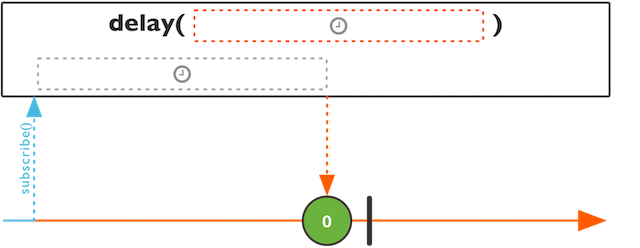
- Parameters:
duration- the duration of the delay- Returns:
- a new
Mono
-
delay
public static Mono<Long> delay(Duration duration, Scheduler timer)
Create a Mono which delays an onNext signal by a givendurationand completes. If the demand cannot be produced in time, an onError will be signalled instead.
-
delayMillis
@Deprecated public static Mono<Long> delayMillis(long duration)
Deprecated. use theDurationbased variants instead, will be removed in 3.1.0Create a Mono which delays an onNext signal ofdurationmilliseconds and complete. If the demand cannot be produced in time, an onError will be signalled instead.
- Parameters:
duration- the duration in milliseconds of the delay- Returns:
- a new
Mono
-
delayMillis
@Deprecated public static Mono<Long> delayMillis(long duration, TimedScheduler timer)
Deprecated. use theDurationbased variants instead, will be removed in 3.1.0Create a Mono which delays an onNext signal ofdurationmilliseconds and complete. If the demand cannot be produced in time, an onError will be signalled instead.
-
empty
public static <T> Mono<T> empty()
Create aMonothat completes without emitting any item.
- Type Parameters:
T- the reifiedSubscribertype- Returns:
- a completed
Mono
-
empty
public static <T> Mono<Void> empty(Publisher<T> source)
Create a newMonothat ignores onNext (dropping them) and only react on Completion signal.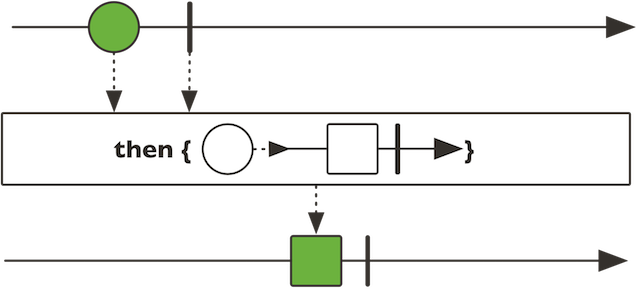
-
error
public static <T> Mono<T> error(Throwable error)
Create aMonothat completes with the specified error immediately after onSubscribe.
- Type Parameters:
T- the reifiedSubscribertype- Parameters:
error- the onError signal- Returns:
- a failed
Mono
-
first
@SafeVarargs public static <T> Mono<T> first(Mono<? extends T>... monos)
Pick the first result coming from any of the given monos and populate a new Mono.
- Type Parameters:
T- The type of the function result.- Parameters:
monos- The deferred monos to use.- Returns:
- a
Mono.
-
first
public static <T> Mono<T> first(Iterable<? extends Mono<? extends T>> monos)
Pick the first result coming from any of the given monos and populate a new Mono.
- Type Parameters:
T- The type of the function result.- Parameters:
monos- The monos to use.- Returns:
- a
Mono.
-
fromCompletionStage
public static <T> Mono<T> fromCompletionStage(CompletionStage<? extends T> completionStage)
- Type Parameters:
T- type of the expected value- Parameters:
completionStage-CompletionStagethat will produce the value or null to complete immediately- Returns:
- A
Mono.
-
fromFuture
public static <T> Mono<T> fromFuture(CompletableFuture<? extends T> future)
- Type Parameters:
T- type of the expected value- Parameters:
future-CompletableFuturethat will produce the value or null to complete immediately- Returns:
- A
Mono. - See Also:
fromCompletionStage for a generalization
-
fromRunnable
public static Mono<Void> fromRunnable(Runnable runnable)
Create aMonoonly producing a completion signal after using the given runnable.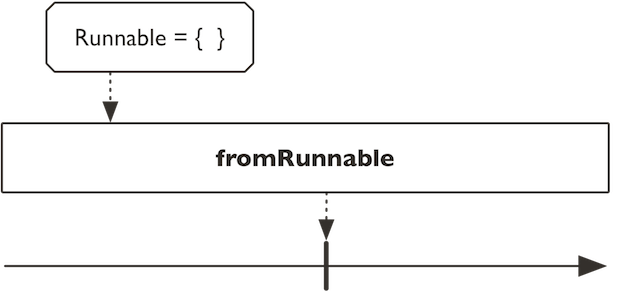
-
ignoreElements
public static <T> Mono<T> ignoreElements(Publisher<T> source)
Create a newMonothat ignores onNext (dropping them) and only react on Completion signal.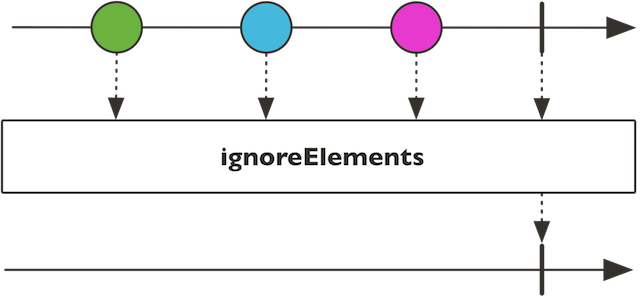
-
just
public static <T> Mono<T> just(T data)
Create a newMonothat emits the specified item.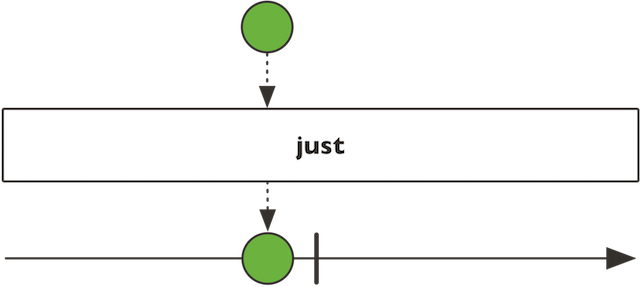
- Type Parameters:
T- the type of the produced item- Parameters:
data- the only item to onNext- Returns:
- a
Mono.
-
justOrEmpty
public static <T> Mono<T> justOrEmpty(Optional<? extends T> data)
Create a newMonothat emits the specified item ifOptional.isPresent()otherwise only emits onComplete.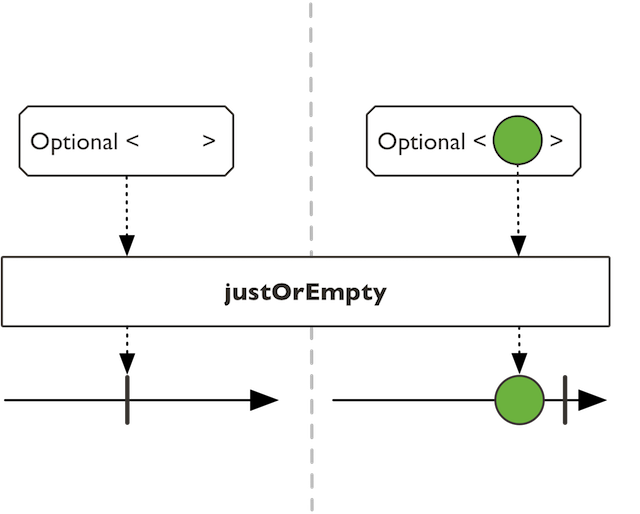
-
justOrEmpty
public static <T> Mono<T> justOrEmpty(T data)
Create a newMonothat emits the specified item if non null otherwise only emits onComplete.
- Type Parameters:
T- the type of the produced item- Parameters:
data- the item to onNext or onComplete if null- Returns:
- a
Mono.
-
never
public static <T> Mono<T> never()
Return aMonothat will never signal any data, error or completion signal.
- Type Parameters:
T- theSubscribertype target- Returns:
- a never completing
Mono
-
sequenceEqual
public static <T> Mono<Boolean> sequenceEqual(Publisher<? extends T> source1, Publisher<? extends T> source2)
Returns a Mono that emits a Boolean value that indicates whether two Publisher sequences are the same by comparing the items emitted by each Publisher pairwise.- Type Parameters:
T- the type of items emitted by each Publisher- Parameters:
source1- the first Publisher to comparesource2- the second Publisher to compare- Returns:
- a Mono that emits a Boolean value that indicates whether the two sequences are the same
-
sequenceEqual
public static <T> Mono<Boolean> sequenceEqual(Publisher<? extends T> source1, Publisher<? extends T> source2, BiPredicate<? super T,? super T> isEqual)
Returns a Mono that emits a Boolean value that indicates whether two Publisher sequences are the same by comparing the items emitted by each Publisher pairwise based on the results of a specified equality function.- Type Parameters:
T- the type of items emitted by each Publisher- Parameters:
source1- the first Publisher to comparesource2- the second Publisher to compareisEqual- a function used to compare items emitted by each Publisher- Returns:
- a Mono that emits a Boolean value that indicates whether the two Publisher two sequences are the same according to the specified function
-
sequenceEqual
public static <T> Mono<Boolean> sequenceEqual(Publisher<? extends T> source1, Publisher<? extends T> source2, BiPredicate<? super T,? super T> isEqual, int bufferSize)
Returns a Mono that emits a Boolean value that indicates whether two Publisher sequences are the same by comparing the items emitted by each Publisher pairwise based on the results of a specified equality function.- Type Parameters:
T- the type of items emitted by each Publisher- Parameters:
source1- the first Publisher to comparesource2- the second Publisher to compareisEqual- a function used to compare items emitted by each PublisherbufferSize- the number of items to prefetch from the first and second source Publisher- Returns:
- a Mono that emits a Boolean value that indicates whether the two Publisher two sequences are the same according to the specified function
-
using
public static <T,D> Mono<T> using(Callable<? extends D> resourceSupplier, Function<? super D,? extends Mono<? extends T>> sourceSupplier, Consumer<? super D> resourceCleanup, boolean eager)
Uses a resource, generated by a supplier for each individual Subscriber, while streaming the value from a Mono derived from the same resource and makes sure the resource is released if the sequence terminates or the Subscriber cancels.- Eager resource cleanup happens just before the source termination and exceptions raised by the cleanup Consumer may override the terminal even.
- Non-eager cleanup will drop any exception.
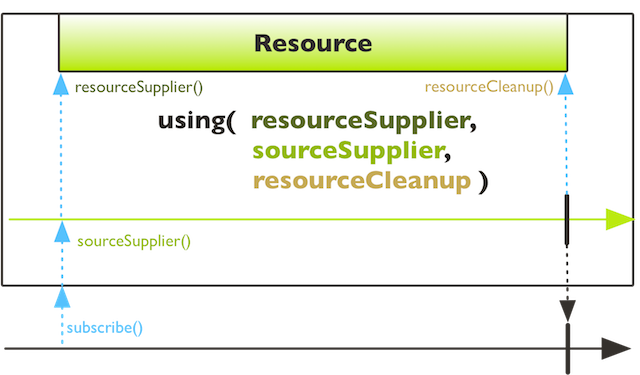
- Type Parameters:
T- emitted typeD- resource type- Parameters:
resourceSupplier- aCallablethat is called on subscribesourceSupplier- aMonofactory derived from the supplied resourceresourceCleanup- invoked on completioneager- true to clean before terminating downstream subscribers- Returns:
- new
Mono
-
using
public static <T,D> Mono<T> using(Callable<? extends D> resourceSupplier, Function<? super D,? extends Mono<? extends T>> sourceSupplier, Consumer<? super D> resourceCleanup)
Uses a resource, generated by a supplier for each individual Subscriber, while streaming the value from a Mono derived from the same resource and makes sure the resource is released if the sequence terminates or the Subscriber cancels.Eager resource cleanup happens just before the source termination and exceptions raised by the cleanup Consumer may override the terminal even.

-
untilOther
public Mono<T> untilOther(Publisher<?> anyPublisher)
Subscribe to this Mono and another Publisher, which will be used as a trigger for the emission of this Mono's element. That is to say, this Mono's element is delayed until the trigger Publisher emits for the first time (or terminates empty).- Parameters:
anyPublisher- the publisher which first emission or termination will trigger the emission of this Mono's value.- Returns:
- this Mono, but delayed until the given publisher emits first or terminates.
-
untilOtherDelayError
public Mono<T> untilOtherDelayError(Publisher<?> anyPublisher)
Subscribe to this Mono and another Publisher, which will be used as a trigger for the emission of this Mono's element, mapped through a provided function. That is to say, this Mono's element is delayed until the trigger Publisher emits for the first time (or terminates empty). Any error is delayed until all publishers have triggered, and multiple errors are combined into one.- Parameters:
anyPublisher- the publisher which first emission or termination will trigger the emission of this Mono's value.- Returns:
- this Mono, but delayed until the given publisher emits first or terminates.
-
when
public static <T1,T2> Mono<Tuple2<T1,T2>> when(Mono<? extends T1> p1, Mono<? extends T2> p2)
Merge given monos into a new a Mono that will be fulfilled when all of the given Monos have been fulfilled. An error will cause pending results to be cancelled and immediate error emission to the returnedMono.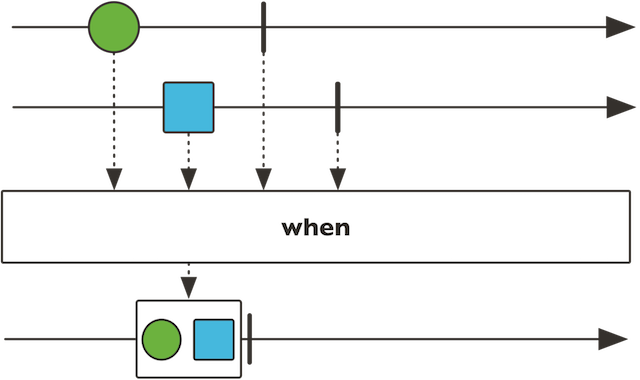
-
when
public static <T1,T2,O> Mono<O> when(Mono<? extends T1> p1, Mono<? extends T2> p2, BiFunction<? super T1,? super T2,? extends O> combinator)
Merge given monos into a new a Mono that will be fulfilled when all of the given Monos have been fulfilled. An error will cause pending results to be cancelled and immediate error emission to the returnedMono.
- Type Parameters:
T1- type of the value from source1T2- type of the value from source2O- output value- Parameters:
p1- The first upstreamPublisherto subscribe to.p2- The second upstreamPublisherto subscribe to.combinator- aBiFunctioncombinator function when both sources complete- Returns:
- a
Mono.
-
when
public static <T1,T2,T3> Mono<Tuple3<T1,T2,T3>> when(Mono<? extends T1> p1, Mono<? extends T2> p2, Mono<? extends T3> p3)
Merge given monos into a new a Mono that will be fulfilled when all of the given Monos have been fulfilled. An error will cause pending results to be cancelled and immediate error emission to the returnedMono.
- Type Parameters:
T1- type of the value from source1T2- type of the value from source2T3- type of the value from source3- Parameters:
p1- The first upstreamPublisherto subscribe to.p2- The second upstreamPublisherto subscribe to.p3- The third upstreamPublisherto subscribe to.- Returns:
- a
Mono.
-
when
public static <T1,T2,T3,T4> Mono<Tuple4<T1,T2,T3,T4>> when(Mono<? extends T1> p1, Mono<? extends T2> p2, Mono<? extends T3> p3, Mono<? extends T4> p4)
Merge given monos into a new a Mono that will be fulfilled when all of the given Monos have been fulfilled. An error will cause pending results to be cancelled and immediate error emission to the returnedMono.
- Type Parameters:
T1- type of the value from source1T2- type of the value from source2T3- type of the value from source3T4- type of the value from source4- Parameters:
p1- The first upstreamPublisherto subscribe to.p2- The second upstreamPublisherto subscribe to.p3- The third upstreamPublisherto subscribe to.p4- The fourth upstreamPublisherto subscribe to.- Returns:
- a
Mono.
-
when
public static <T1,T2,T3,T4,T5> Mono<Tuple5<T1,T2,T3,T4,T5>> when(Mono<? extends T1> p1, Mono<? extends T2> p2, Mono<? extends T3> p3, Mono<? extends T4> p4, Mono<? extends T5> p5)
Merge given monos into a new a Mono that will be fulfilled when all of the given Monos have been fulfilled. An error will cause pending results to be cancelled and immediate error emission to the returnedMono.
- Type Parameters:
T1- type of the value from source1T2- type of the value from source2T3- type of the value from source3T4- type of the value from source4T5- type of the value from source5- Parameters:
p1- The first upstreamPublisherto subscribe to.p2- The second upstreamPublisherto subscribe to.p3- The third upstreamPublisherto subscribe to.p4- The fourth upstreamPublisherto subscribe to.p5- The fifth upstreamPublisherto subscribe to.- Returns:
- a
Mono.
-
when
public static <T1,T2,T3,T4,T5,T6> Mono<Tuple6<T1,T2,T3,T4,T5,T6>> when(Mono<? extends T1> p1, Mono<? extends T2> p2, Mono<? extends T3> p3, Mono<? extends T4> p4, Mono<? extends T5> p5, Mono<? extends T6> p6)
Merge given monos into a new a Mono that will be fulfilled when all of the given Monos have been fulfilled. An error will cause pending results to be cancelled and immediate error emission to the returnedMono.
- Type Parameters:
T1- type of the value from source1T2- type of the value from source2T3- type of the value from source3T4- type of the value from source4T5- type of the value from source5T6- type of the value from source6- Parameters:
p1- The first upstreamPublisherto subscribe to.p2- The second upstreamPublisherto subscribe to.p3- The third upstreamPublisherto subscribe to.p4- The fourth upstreamPublisherto subscribe to.p5- The fifth upstreamPublisherto subscribe to.p6- The sixth upstreamPublisherto subscribe to.- Returns:
- a
Mono.
-
when
public static Mono<Void> when(Iterable<? extends Publisher<Void>> sources)
Aggregate given void publishers into a new a Mono that will be fulfilled when all of the given Monos have been fulfilled. If any Mono terminates without value, the returned sequence will be terminated immediately and pending results cancelled.
- Parameters:
sources- The sources to use.- Returns:
- a
Mono.
-
when
public static <R> Mono<R> when(Iterable<? extends Mono<?>> monos, Function<? super Object[],? extends R> combinator)
Aggregate given monos into a new a Mono that will be fulfilled when all of the given Monos have been fulfilled. If any Mono terminates without value, the returned sequence will be terminated immediately and pending results cancelled.
- Type Parameters:
R- the combined result- Parameters:
monos- The monos to use.combinator- the function to transform the combined array into an arbitrary object.- Returns:
- a
Mono.
-
when
@SafeVarargs public static Mono<Void> when(Publisher<Void>... sources)
Aggregate given void publisher into a new a Mono that will be fulfilled when all of the given sources have been fulfilled. An error will cause pending results to be cancelled and immediate error emission to the returnedMono.
- Parameters:
sources- The sources to use.- Returns:
- a
Mono.
-
when
public static <R> Mono<R> when(Function<? super Object[],? extends R> combinator, Mono<?>... monos)
Aggregate given monos into a new a Mono that will be fulfilled when all of the given Monos have been fulfilled. An error will cause pending results to be cancelled and immediate error emission to the returnedMono.
- Type Parameters:
R- the combined result- Parameters:
monos- The monos to use.combinator- the function to transform the combined array into an arbitrary object.- Returns:
- a
Mono.
-
whenDelayError
public static <T1,T2> Mono<Tuple2<T1,T2>> whenDelayError(Mono<? extends T1> p1, Mono<? extends T2> p2)
Merge given monos into a new a Mono that will be fulfilled when all of the given Monos have been fulfilled. If both Monos error, the two exceptions are combined (suppressed into a combining exception).
-
whenDelayError
public static <T1,T2,T3> Mono<Tuple3<T1,T2,T3>> whenDelayError(Mono<? extends T1> p1, Mono<? extends T2> p2, Mono<? extends T3> p3)
Merge given monos into a new a Mono that will be fulfilled when all of the given Mono Monos have been fulfilled. If several Monos error, the exceptions are combined (suppressed into a combining exception).
- Type Parameters:
T1- type of the value from source1T2- type of the value from source2T3- type of the value from source3- Parameters:
p1- The first upstreamPublisherto subscribe to.p2- The second upstreamPublisherto subscribe to.p3- The third upstreamPublisherto subscribe to.- Returns:
- a
Mono.
-
whenDelayError
public static <T1,T2,T3,T4> Mono<Tuple4<T1,T2,T3,T4>> whenDelayError(Mono<? extends T1> p1, Mono<? extends T2> p2, Mono<? extends T3> p3, Mono<? extends T4> p4)
Merge given monos into a new a Mono that will be fulfilled when all of the given Monos have been fulfilled. If several Monos error, the exceptions are combined (suppressed into a combining exception).
- Type Parameters:
T1- type of the value from source1T2- type of the value from source2T3- type of the value from source3T4- type of the value from source4- Parameters:
p1- The first upstreamPublisherto subscribe to.p2- The second upstreamPublisherto subscribe to.p3- The third upstreamPublisherto subscribe to.p4- The fourth upstreamPublisherto subscribe to.- Returns:
- a
Mono.
-
whenDelayError
public static <T1,T2,T3,T4,T5> Mono<Tuple5<T1,T2,T3,T4,T5>> whenDelayError(Mono<? extends T1> p1, Mono<? extends T2> p2, Mono<? extends T3> p3, Mono<? extends T4> p4, Mono<? extends T5> p5)
Merge given monos into a new a Mono that will be fulfilled when all of the given Monos have been fulfilled. If several Monos error, the exceptions are combined (suppressed into a combining exception).
- Type Parameters:
T1- type of the value from source1T2- type of the value from source2T3- type of the value from source3T4- type of the value from source4T5- type of the value from source5- Parameters:
p1- The first upstreamPublisherto subscribe to.p2- The second upstreamPublisherto subscribe to.p3- The third upstreamPublisherto subscribe to.p4- The fourth upstreamPublisherto subscribe to.p5- The fifth upstreamPublisherto subscribe to.- Returns:
- a
Mono.
-
whenDelayError
public static <T1,T2,T3,T4,T5,T6> Mono<Tuple6<T1,T2,T3,T4,T5,T6>> whenDelayError(Mono<? extends T1> p1, Mono<? extends T2> p2, Mono<? extends T3> p3, Mono<? extends T4> p4, Mono<? extends T5> p5, Mono<? extends T6> p6)
Merge given monos into a new a Mono that will be fulfilled when all of the given Monos have been fulfilled. If several Monos error, the exceptions are combined (suppressed into a combining exception).
- Type Parameters:
T1- type of the value from source1T2- type of the value from source2T3- type of the value from source3T4- type of the value from source4T5- type of the value from source5T6- type of the value from source6- Parameters:
p1- The first upstreamPublisherto subscribe to.p2- The second upstreamPublisherto subscribe to.p3- The third upstreamPublisherto subscribe to.p4- The fourth upstreamPublisherto subscribe to.p5- The fifth upstreamPublisherto subscribe to.p6- The sixth upstreamPublisherto subscribe to.- Returns:
- a
Mono.
-
whenDelayError
public static Mono<Void> whenDelayError(Iterable<? extends Publisher<Void>> sources)
Aggregate given void publishers into a new a Mono that will be fulfilled when all of the given sources have been fulfilled. If any Publisher terminates without value, the returned sequence will be terminated immediately and pending results cancelled. If several Publishers error, the exceptions are combined (suppressed into a combining exception).
- Parameters:
sources- The sources to use.- Returns:
- a
Mono.
-
whenDelayError
public static <R> Mono<R> whenDelayError(Iterable<? extends Mono<?>> monos, Function<? super Object[],? extends R> combinator)
Aggregate given monos into a new a Mono that will be fulfilled when all of the given Monos have been fulfilled. If any Mono terminates without value, the returned sequence will be terminated immediately and pending results cancelled. If several Monos error, the exceptions are combined (suppressed into a combining exception).
- Type Parameters:
R- the combined result- Parameters:
monos- The monos to use.combinator- the function to transform the combined array into an arbitrary object.- Returns:
- a
Mono.
-
whenDelayError
@SafeVarargs public static Mono<Void> whenDelayError(Publisher<Void>... sources)
Merge given void publishers into a new a Mono that will be fulfilled when all of the given sources have been fulfilled. If several Publishers error, the exceptions are combined (suppressed into a combining exception).
- Parameters:
sources- The sources to use.- Returns:
- a
Mono.
-
whenDelayError
public static <R> Mono<R> whenDelayError(Function<? super Object[],? extends R> combinator, Mono<?>... monos)
Merge given monos into a new a Mono that will be fulfilled when all of the given Monos have been fulfilled. If several Monos error, the exceptions are combined (suppressed into a combining exception).
- Type Parameters:
R- the combined result- Parameters:
monos- The monos to use.combinator- the function to transform the combined array into an arbitrary object.- Returns:
- a combined
Mono.
-
zip
@SafeVarargs public static <T,V> Mono<V> zip(Function<? super Object[],? extends V> combinator, Mono<? extends T>... monos)
Aggregate given monos into a new a Mono that will be fulfilled when all of the given Monos have been fulfilled. If any Mono terminates without value, the returned sequence will be terminated immediately and pending results cancelled.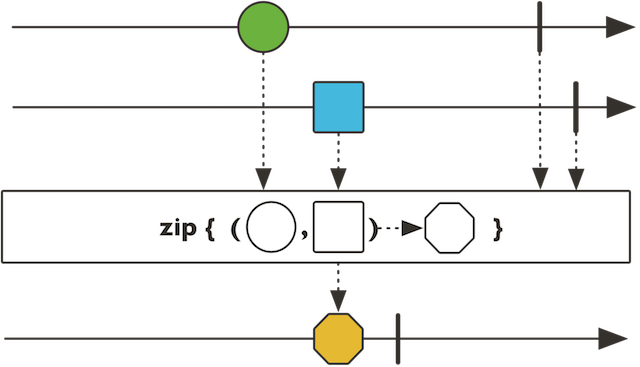
-
zip
public static <T,V> Mono<V> zip(Function<? super Object[],? extends V> combinator, Iterable<? extends Mono<? extends T>> monos)
Aggregate given monos into a new a Mono that will be fulfilled when all of the given Monos have been fulfilled. If any Mono terminates without value, the returned sequence will be terminated immediately and pending results cancelled.
-
as
public final <P> P as(Function<? super Mono<T>,P> transformer)
Transform thisMonointo a target type.mono.as(Flux::from).subscribe()- Type Parameters:
P- the returned instance type- Parameters:
transformer- theFunctionapplying thisMono- Returns:
- the transformed
Monoto instance P - See Also:
for a bounded conversion to {@link Publisher}
-
and
public final <T2> Mono<Tuple2<T,T2>> and(Mono<? extends T2> other)
Combine the result from this mono and another into aTuple2.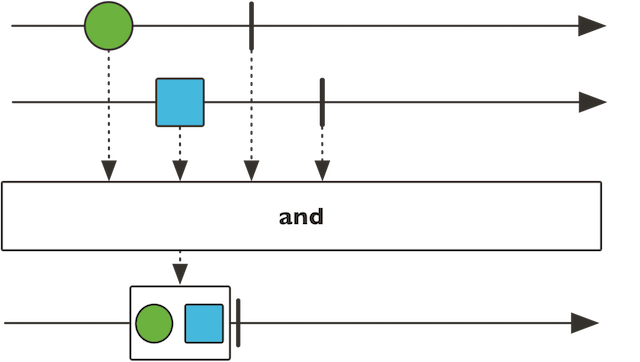
- Type Parameters:
T2- the element type of the other Mono instance- Parameters:
other- theMonoto combine with- Returns:
- a new combined Mono
- See Also:
when(reactor.core.publisher.Mono<? extends T1>, reactor.core.publisher.Mono<? extends T2>)
-
and
public final <T2,O> Mono<O> and(Mono<? extends T2> other, BiFunction<? super T,? super T2,? extends O> combinator)
Combine the result from this mono and another into an arbitraryOobject, as defined by the providedcombinatorfunction.
- Type Parameters:
T2- the element type of the other Mono instanceO- the element type of the combination- Parameters:
other- theMonoto combine withcombinator- aBiFunctioncombinator function when both sources complete- Returns:
- a new combined Mono
- See Also:
when(reactor.core.publisher.Mono<? extends T1>, reactor.core.publisher.Mono<? extends T2>)
-
and
public final <T2> Mono<Tuple2<T,T2>> and(Function<T,Mono<? extends T2>> rightGenerator)
Wait for the result from this mono, use it to create a second mono via the providedrightGeneratorfunction and combine both results into aTuple2.
- Type Parameters:
T2- the element type of the other Mono instance- Parameters:
rightGenerator- theFunctionto generate aMonoto combine with- Returns:
- a new combined Mono
-
and
public final <T2,O> Mono<O> and(Function<T,Mono<? extends T2>> rightGenerator, BiFunction<T,T2,O> combinator)
Wait for the result from this mono, use it to create a second mono via the providedrightGeneratorfunction and combine both results into an arbitraryOobject, as defined by the providedcombinatorfunction.
- Type Parameters:
T2- the element type of the other Mono instanceO- the element type of the combination- Parameters:
rightGenerator- theFunctionto generate aMonoto combine withcombinator- aBiFunctioncombinator function when both sources complete- Returns:
- a new combined Mono
-
awaitOnSubscribe
public final Mono<T> awaitOnSubscribe()
Intercepts the onSubscribe call and makes sure calls to Subscription methods only happen after the child Subscriber has returned from its onSubscribe method.This helps with child Subscribers that don't expect a recursive call from onSubscribe into their onNext because, for example, they request immediately from their onSubscribe but don't finish their preparation before that and onNext runs into a half-prepared state. This can happen with non Reactor based Subscribers.
- Returns:
- non reentrant onSubscribe
Mono
-
block
public T block()
Block until a next signal is received, will return null if onComplete, T if onNext, throw a Exceptions.DownstreamException if checked error or origin RuntimeException if unchecked.
- Returns:
- T the result
-
block
public T block(Duration timeout)
Block until a next signal is received, will return null if onComplete, T if onNext, throw a Exceptions.DownstreamException if checked error or origin RuntimeException if unchecked. If the default timeout 30 seconds has elapsed,aRuntimeExceptionwill be thrown. Note that each block() will subscribe a new single (MonoSink) subscriber, in other words, the result might miss signal from hot publishers.
- Parameters:
timeout- maximum time period to wait for before raising aRuntimeException- Returns:
- T the result
-
blockMillis
@Deprecated public final T blockMillis(long timeout)
Deprecated. use theDurationbased variants instead, will be removed in 3.1.0Block until a next signal is received, will return null if onComplete, T if onNext, throw a Exceptions.DownstreamException if checked error or origin RuntimeException if unchecked. If the default timeout 30 seconds has elapsed, aRuntimeExceptionwill be thrown. Note that each block() will subscribe a new single (MonoSink) subscriber, in other words, the result might miss signal from hot publishers.
- Parameters:
timeout- maximum time period to wait for in milliseconds before raising aRuntimeException- Returns:
- T the result
-
cast
public final <E> Mono<E> cast(Class<E> clazz)
Cast the currentMonoproduced type into a target produced type.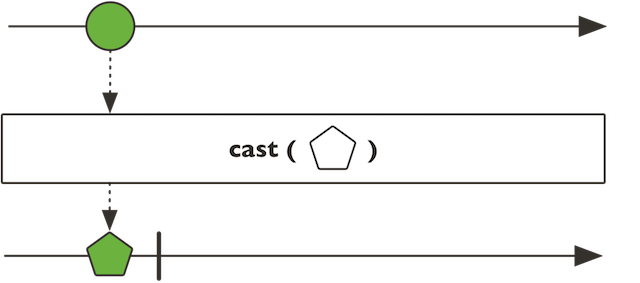
-
cache
public final Mono<T> cache()
Turn thisMonointo a hot source and cache last emitted signals for furtherSubscriber. Completion and Error will also be replayed.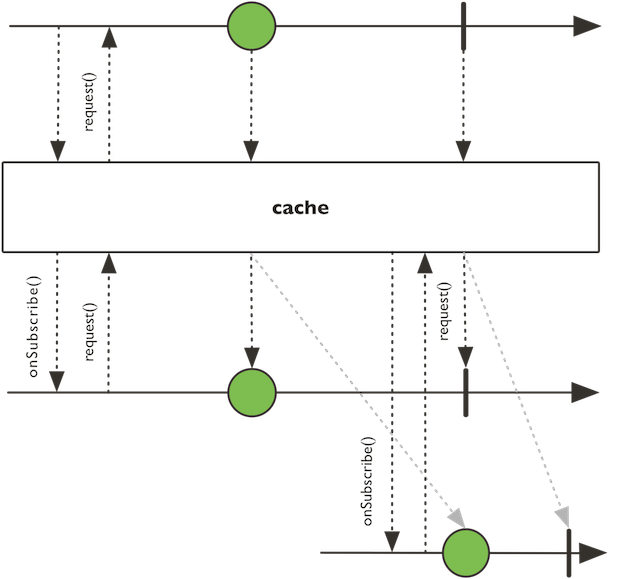
- Returns:
- a replaying
Mono
-
checkpoint
public final Mono<T> checkpoint()
Activate assembly tracing for this particularMono, in case of an error upstream of the checkpoint.It should be placed towards the end of the reactive chain, as errors triggered downstream of it cannot be observed and augmented with assembly trace.
- Returns:
- the assembly tracing
Mono
-
checkpoint
public final Mono<T> checkpoint(String description)
Activate assembly tracing for this particularMonoand give it a description that will be reflected in the assembly traceback, in case of an error upstream of the checkpoint.It should be placed towards the end of the reactive chain, as errors triggered downstream of it cannot be observed and augmented with assembly trace.
The description could for example be a meaningful name for the assembled mono or a wider correlation ID.
- Parameters:
description- a description to include in the assembly traceback.- Returns:
- the assembly tracing
Mono
-
compose
public final <V> Mono<V> compose(Function<? super Mono<T>,? extends Publisher<V>> transformer)
Defer the given transformation to thisMonoin order to generate a targetMonotype. A transformation will occur for eachSubscriber.flux.compose(Mono::from).subscribe()
-
defaultIfEmpty
public final Mono<T> defaultIfEmpty(T defaultV)
Provide a default unique value if this mono is completed without any data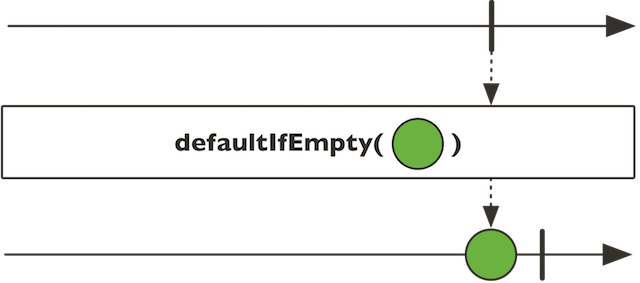
- Parameters:
defaultV- the alternate value if this sequence is empty- Returns:
- a new
Mono - See Also:
Flux.defaultIfEmpty(Object)
-
delayElement
public final Mono<T> delayElement(Duration delay)
Delay thisFluxelement (Subscriber.onNext(T)signal) by a given duration. Empty monos or error signals are not delayed.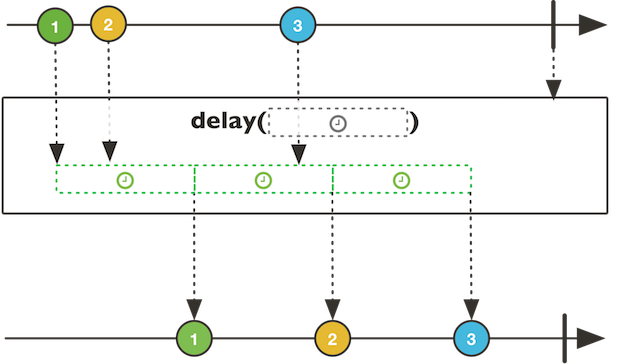
Note that the scheduler on which the mono chain continues execution will be the
parallelscheduler if the mono is valued, or the current scheduler if the mono completes empty or errors.- Parameters:
delay- period to delay eachSubscriber.onNext(T)signal- Returns:
- a delayed
Mono
-
delayElement
public final Mono<T> delayElement(Duration delay, Scheduler timer)
Delay thisFluxelement (Subscriber.onNext(T)signal) by a givenDuration. Empty monos or error signals are not delayed.
Note that the scheduler on which the mono chain continues execution will be the time scheduler provided if the mono is valued, or the current scheduler if the mono completes empty or errors.
- Parameters:
delay-Durationto delay eachSubscriber.onNext(T)signaltimer- a time-capableSchedulerinstance to delay the value signal on- Returns:
- a delayed
Mono
-
delayElementMillis
@Deprecated public final Mono<T> delayElementMillis(long delay)
Deprecated. use theDurationbased variants instead, will be removed in 3.1.0Delay thisFluxelement (Subscriber.onNext(T)signal) by a given duration, in milliseconds. Empty monos or error signals are not delayed.
Note that the scheduler on which the mono chain continues execution will be the time scheduler provided if the mono is valued, or the current scheduler if the mono completes empty or errors.
- Parameters:
delay- period to delay eachSubscriber.onNext(T)signal, in milliseconds- Returns:
- a delayed
Mono
-
delayElementMillis
@Deprecated public final Mono<T> delayElementMillis(long delay, TimedScheduler timer)
Deprecated. use theDurationbased variants instead, will be removed in 3.1.0Delay thisFluxelement (Subscriber.onNext(T)signal) by a given duration, in milliseconds. Empty monos or error signals are not delayed.
Note that the scheduler on which the mono chain continues execution will be the
parallelif the mono is valued, or the current scheduler if the mono completes empty or errors.- Parameters:
delay- period to delay eachSubscriber.onNext(T)signal, in millisecondstimer- a time-capableSchedulerinstance to delay the value signal on- Returns:
- a delayed
Mono
-
delaySubscription
public final <U> Mono<T> delaySubscription(Publisher<U> subscriptionDelay)
- Type Parameters:
U- the other source type- Parameters:
subscriptionDelay- aPublisherto signal by next or complete thisPublisher.subscribe(Subscriber)- Returns:
- a delayed
Mono
-
delaySubscriptionMillis
@Deprecated public final Mono<T> delaySubscriptionMillis(long delay)
Deprecated. use theDurationbased variants instead, will be removed in 3.1.0Delay thesubscriptionto thisMonosource until the given period elapses. The delay is introduced through theparalleldefault Scheduler.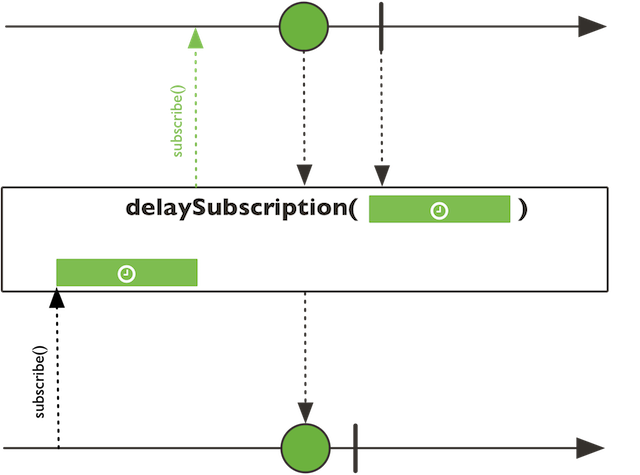
-
delaySubscriptionMillis
@Deprecated public final Mono<T> delaySubscriptionMillis(long delay, TimedScheduler timer)
Deprecated. use theDurationbased variants instead, will be removed in 3.1.0Delay thesubscriptionto thisMonosource until the given period elapses. The delay is introduced through theparalleldefault Scheduler.
-
dematerialize
public final <X> Mono<X> dematerialize()
A "phantom-operator" working only if thisMonois a emits onNext, onError or onCompleteSignal. The relativeSubscribercallback will be invoked, errorSignalwill trigger onError and completeSignalwill trigger onComplete.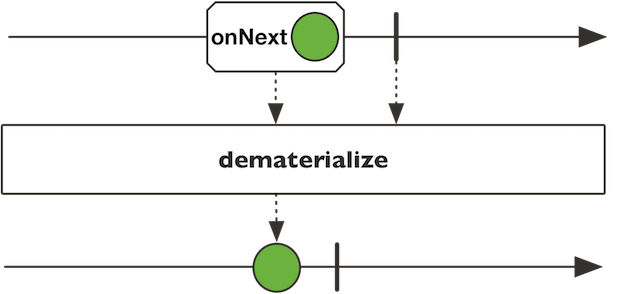
- Type Parameters:
X- the dematerialized type- Returns:
- a dematerialized
Mono
-
doAfterTerminate
public final Mono<T> doAfterTerminate(BiConsumer<? super T,Throwable> afterTerminate)
Triggered after theMonoterminates, either by completing downstream successfully or with an error. The arguments will be null depending on success, success with data and error:- null, null : completed without data
- T, null : completed with data
- null, Throwable : failed with/without data
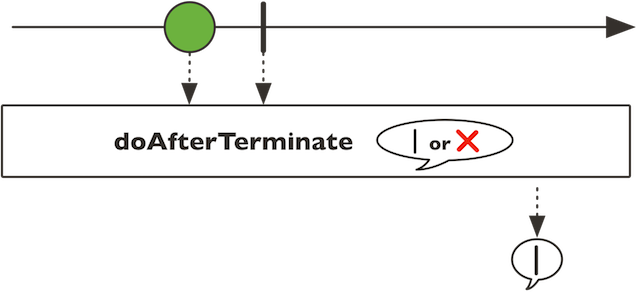
- Parameters:
afterTerminate- the callback to call afterSubscriber.onNext(T),Subscriber.onComplete()without precedingSubscriber.onNext(T)orSubscriber.onError(java.lang.Throwable)- Returns:
- a new
Mono
-
doFinally
public final Mono<T> doFinally(Consumer<SignalType> onFinally)
Triggering aftertheMonoterminates for any reason, including cancellation. The terminating event (SignalType.ON_COMPLETE,SignalType.ON_ERRORandSignalType.CANCEL) is passed to the consumer, which is executed after the signal has been passed downstream.Note that the fact that the signal is propagated downstream before the callback is executed means that several doFinally in a row will be executed in reverse order. If you want to assert the execution of the callback please keep in mind that the Mono will complete before it is executed, so its effect might not be visible immediately after eg. a
block().- Parameters:
onFinally- the callback to execute after a terminal signal (complete, error or cancel)- Returns:
- an observed
Mono
-
doOnCancel
public final Mono<T> doOnCancel(Runnable onCancel)
Triggered when theMonois cancelled.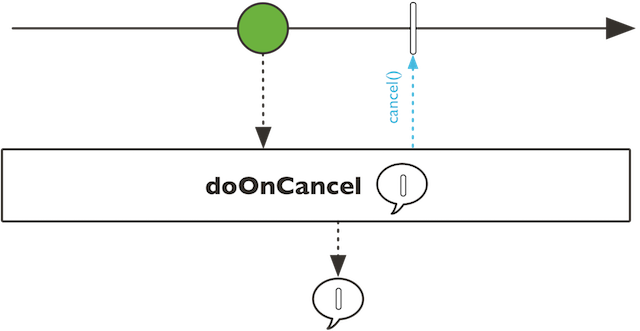
- Parameters:
onCancel- the callback to call onSubscription.cancel()- Returns:
- a new
Mono
-
doOnNext
public final Mono<T> doOnNext(Consumer<? super T> onNext)
Triggered when theMonoemits a data successfully.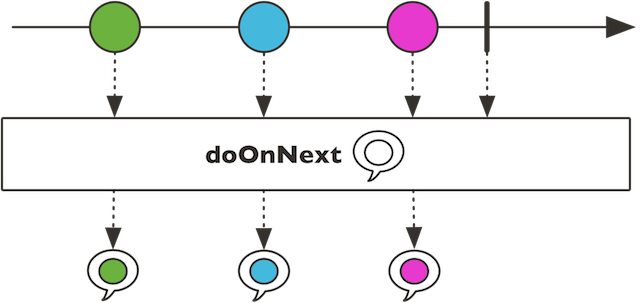
- Parameters:
onNext- the callback to call onSubscriber.onNext(T)- Returns:
- a new
Mono
-
doOnSuccess
public final Mono<T> doOnSuccess(Consumer<? super T> onSuccess)
Triggered when theMonocompletes successfully.- null : completed without data
- T: completed with data
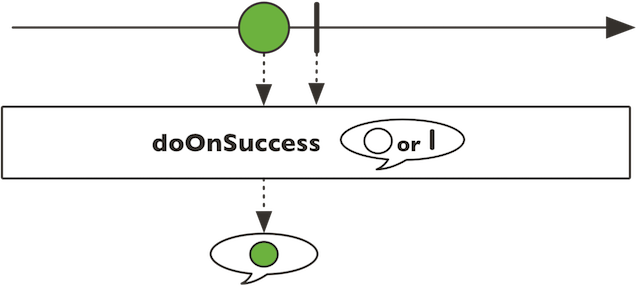
- Parameters:
onSuccess- the callback to call on, argument is null if theMonocompletes without dataSubscriber.onNext(T)orSubscriber.onComplete()without precedingSubscriber.onNext(T)- Returns:
- a new
Mono
-
doOnEach
public final Mono<T> doOnEach(Consumer<? super Signal<T>> signalConsumer)
Triggers side-effects when theMonoemits an item, fails with an error or completes successfully. All these events are represented as aSignalthat is passed to the side-effect callback. Note that this is an advanced operator, typically used for monitoring of a Mono.- Parameters:
signalConsumer- the mandatory callback to call onSubscriber.onNext(Object),Subscriber.onError(Throwable)andSubscriber.onComplete()- Returns:
- an observed
Mono - See Also:
doOnNext(Consumer),doOnError(Consumer),materialize(),Signal
-
doOnError
public final Mono<T> doOnError(Consumer<? super Throwable> onError)
Triggered when theMonocompletes with an error.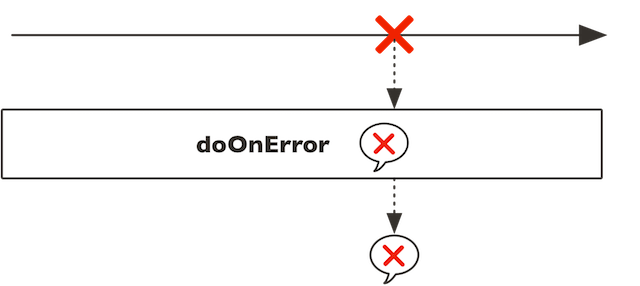
- Parameters:
onError- the error callback to call onSubscriber.onError(Throwable)- Returns:
- a new
Mono
-
doOnError
public final <E extends Throwable> Mono<T> doOnError(Class<E> exceptionType, Consumer<? super E> onError)
Triggered when theMonocompletes with an error matching the given exception type.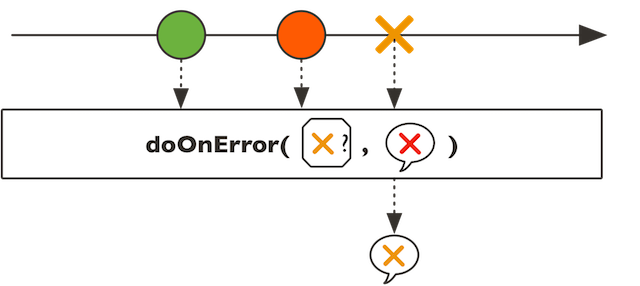
- Type Parameters:
E- type of the error to handle- Parameters:
exceptionType- the type of exceptions to handleonError- the error handler for each error- Returns:
- an observed
Mono
-
doOnError
public final Mono<T> doOnError(Predicate<? super Throwable> predicate, Consumer<? super Throwable> onError)
Triggered when theMonocompletes with an error matching the given exception.
- Parameters:
predicate- the matcher for exceptions to handleonError- the error handler for each error- Returns:
- an observed
Mono
-
doOnRequest
public final Mono<T> doOnRequest(LongConsumer consumer)
- Parameters:
consumer- the consumer to invoke on each request- Returns:
- an observed
Mono
-
doOnSubscribe
public final Mono<T> doOnSubscribe(Consumer<? super Subscription> onSubscribe)
Triggered when theMonois subscribed.
- Parameters:
onSubscribe- the callback to call onSubscriber.onSubscribe(Subscription)- Returns:
- a new
Mono
-
doOnTerminate
public final Mono<T> doOnTerminate(BiConsumer<? super T,Throwable> onTerminate)
Triggered when theMonoterminates, either by completing successfully or with an error.- null, null : completing without data
- T, null : completing with data
- null, Throwable : failing with/without data
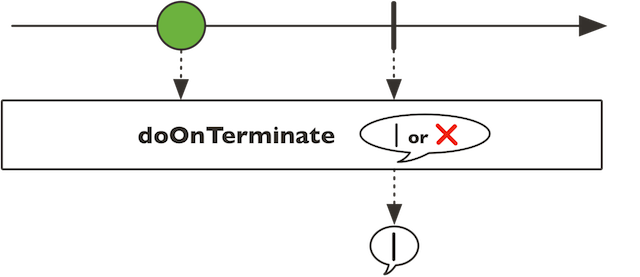
- Parameters:
onTerminate- the callback to callSubscriber.onNext(T),Subscriber.onComplete()without precedingSubscriber.onNext(T)orSubscriber.onError(java.lang.Throwable)- Returns:
- a new
Mono
-
elapsed
public final Mono<Tuple2<Long,T>> elapsed()
Map thisMonosequence intoTuple2of T1Longtimemillis and T2Tassociated data. The timemillis corresponds to the elapsed time between the subscribe and the first next signal.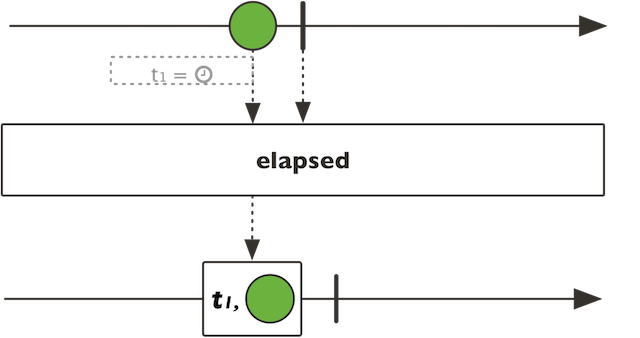
- Returns:
- a transforming
Monothat emits a tuple of time elapsed in milliseconds and matching data
-
elapsed
@Deprecated public final Mono<Tuple2<Long,T>> elapsed(TimedScheduler scheduler)
Deprecated. useelapsed(Scheduler)
-
filter
public final Mono<T> filter(Predicate<? super T> tester)
Test the result if any of thisMonoand replay it if predicate returns true. Otherwise complete without value.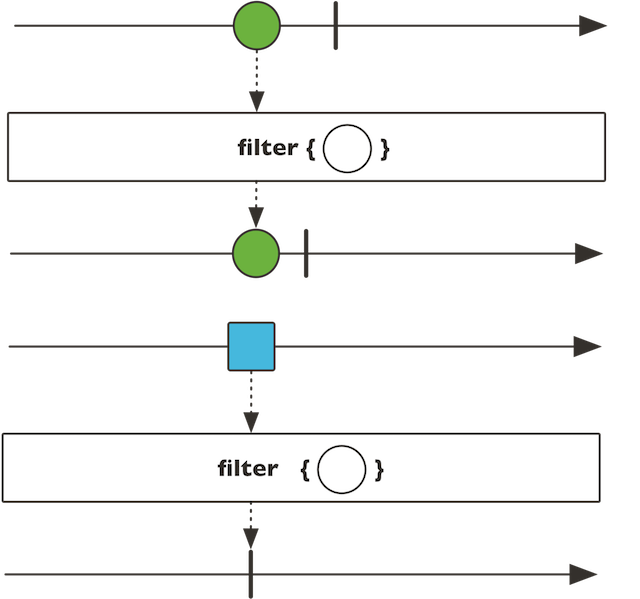
- Parameters:
tester- the predicate to evaluate- Returns:
- a filtered
Mono
-
filterWhen
public final Mono<T> filterWhen(Function<? super T,? extends Publisher<Boolean>> asyncPredicate)
If thisMonois valued, test the value asynchronously using a generatedPublisher<Boolean>test. The value from the Mono is replayed if the first item emitted by the test is true. It is dropped if the test is either empty or its first emitted value is false.Note that only the first value of the test publisher is considered, and unless it is a
Mono, test will be cancelled after receiving that first value.
-
flatMap
@Deprecated public final <R> Flux<R> flatMap(Function<? super T,? extends Publisher<? extends R>> mapper)
Deprecated. will change signature and behavior in 3.1 to reflect currentthen(Function). flatMap will be renamedflatMapMany(Function), so use that instead.Transform the item emitted by thisMonointo a Publisher, then forward its emissions into the returnedFlux.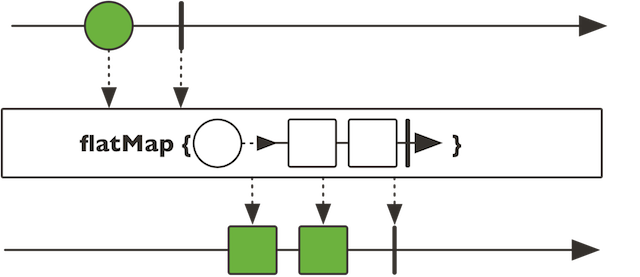
- Type Parameters:
R- the merged sequence type- Parameters:
mapper- theFunctionto produce a sequence of R from the the eventual passedSubscriber.onNext(T)- Returns:
- a new
Fluxas the sequence is not guaranteed to be single at most
-
flatMap
@Deprecated public final <R> Flux<R> flatMap(Function<? super T,? extends Publisher<? extends R>> mapperOnNext, Function<Throwable,? extends Publisher<? extends R>> mapperOnError, Supplier<? extends Publisher<? extends R>> mapperOnComplete)
Deprecated. will change signature and behavior in 3.1 to reflect currentthen(Function). flatMap will be renamedflatMapMany(Function, Function, Supplier), so use that instead.Transform the signals emitted by thisMonointo a Publisher, then forward its emissions into the returnedFlux.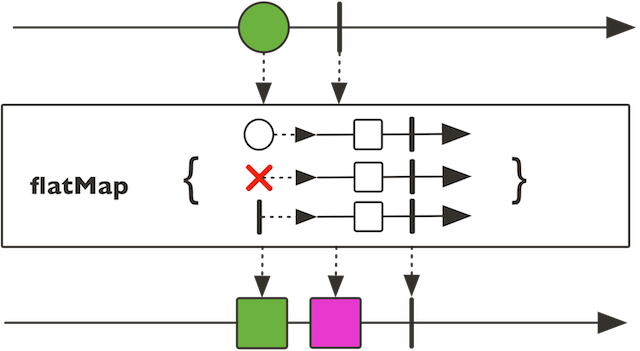
- Type Parameters:
R- the type of the produced inner sequence- Parameters:
mapperOnNext- theFunctionto call on next data and returning a sequence to mergemapperOnError- theFunctionto call on error signal and returning a sequence to mergemapperOnComplete- theFunctionto call on complete signal and returning a sequence to merge- Returns:
- a new
Fluxas the sequence is not guaranteed to be single at most - See Also:
Flux.flatMap(Function, Function, Supplier)
-
flatMapMany
public final <R> Flux<R> flatMapMany(Function<? super T,? extends Publisher<? extends R>> mapper)
Transform the item emitted by thisMonointo a Publisher, then forward its emissions into the returnedFlux.
- Type Parameters:
R- the merged sequence type- Parameters:
mapper- theFunctionto produce a sequence of R from the the eventual passedSubscriber.onNext(T)- Returns:
- a new
Fluxas the sequence is not guaranteed to be single at most
-
flatMapMany
public final <R> Flux<R> flatMapMany(Function<? super T,? extends Publisher<? extends R>> mapperOnNext, Function<? super Throwable,? extends Publisher<? extends R>> mapperOnError, Supplier<? extends Publisher<? extends R>> mapperOnComplete)
Transform the signals emitted by thisMonointo a Publisher, then forward its emissions into the returnedFlux.
- Type Parameters:
R- the type of the produced inner sequence- Parameters:
mapperOnNext- theFunctionto call on next data and returning a sequence to mergemapperOnError- theFunctionto call on error signal and returning a sequence to mergemapperOnComplete- theFunctionto call on complete signal and returning a sequence to merge- Returns:
- a new
Fluxas the sequence is not guaranteed to be single at most - See Also:
Flux.flatMap(Function, Function, Supplier)
-
flatMapIterable
public final <R> Flux<R> flatMapIterable(Function<? super T,? extends Iterable<? extends R>> mapper)
-
hasElement
public final Mono<Boolean> hasElement()
Emit a single boolean true if thisMonohas an element.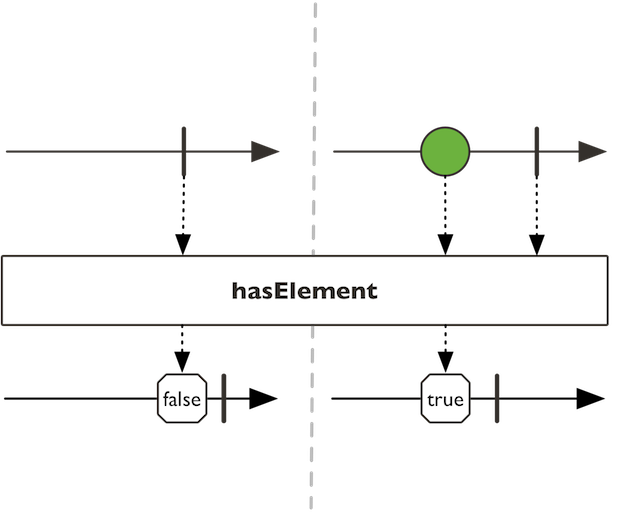
- Returns:
- a new
Monowithtrueif a value is emitted andfalseotherwise
-
handle
public final <R> Mono<R> handle(BiConsumer<? super T,SynchronousSink<R>> handler)
Handle the items emitted by thisMonoby calling a biconsumer with the output sink for each onNext. At most oneSynchronousSink.next(Object)call must be performed and/or 0 or 1SynchronousSink.error(Throwable)orSynchronousSink.complete().- Type Parameters:
R- the transformed type- Parameters:
handler- the handlingBiConsumer- Returns:
- a transformed
Mono
-
hide
public final Mono<T> hide()
Hides the identity of thisMonoinstance.The main purpose of this operator is to prevent certain identity-based optimizations from happening, mostly for diagnostic purposes.
- Returns:
- a new
Monoinstance
-
ignoreElement
public final Mono<T> ignoreElement()
Ignores onNext signal (dropping it) and only reacts on termination.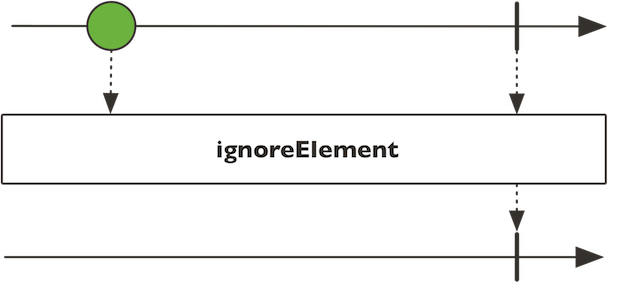
- Returns:
- a new completable
Mono.
-
log
public final Mono<T> log()
Observe all Reactive Streams signals and useLoggersupport to handle trace implementation. Default will useLevel.INFOand java.util.logging. If SLF4J is available, it will be used instead.
The default log category will be "Mono". A generated operator suffix will complete, e.g. "reactor.Flux.Map".
- Returns:
- a new
Mono - See Also:
Flux.log()
-
log
public final Mono<T> log(String category)
Observe all Reactive Streams signals and useLoggersupport to handle trace implementation. Default will useLevel.INFOand java.util.logging. If SLF4J is available, it will be used instead.
- Parameters:
category- to be mapped into logger configuration (e.g. org.springframework .reactor). If category ends with "." like "reactor.", a generated operator suffix will complete, e.g. "reactor.Flux.Map".- Returns:
- a new
Mono
-
log
public final Mono<T> log(String category, Level level, SignalType... options)
Observe Reactive Streams signals matching the passed flagsoptionsand useLoggersupport to handle trace implementation. Default will use the passedLeveland java.util.logging. If SLF4J is available, it will be used instead. Options allow fine grained filtering of the traced signal, for instance to only capture onNext and onError:mono.log("category", SignalType.ON_NEXT, SignalType.ON_ERROR)
- Parameters:
category- to be mapped into logger configuration (e.g. org.springframework .reactor). If category ends with "." like "reactor.", a generated operator suffix will complete, e.g. "reactor.Flux.Map".level- theLevelto enforce for this tracing Mono (only FINEST, FINE, INFO, WARNING and SEVERE are taken into account)options- a varargSignalTypeoption to filter log messages- Returns:
- a new
Mono
-
log
public final Mono<T> log(String category, Level level, boolean showOperatorLine, SignalType... options)
Observe Reactive Streams signals matching the passed filteroptionsand useLoggersupport to handle trace implementation. Default will use the passedLeveland java.util.logging. If SLF4J is available, it will be used instead. Options allow fine grained filtering of the traced signal, for instance to only capture onNext and onError:mono.log("category", Level.INFO, SignalType.ON_NEXT, SignalType.ON_ERROR)
- Parameters:
category- to be mapped into logger configuration (e.g. org.springframework .reactor). If category ends with "." like "reactor.", a generated operator suffix will complete, e.g. "reactor.Mono.Map".level- theLevelto enforce for this tracing Mono (only FINEST, FINE, INFO, WARNING and SEVERE are taken into account)showOperatorLine- capture the current stack to display operator class/line number.options- a varargSignalTypeoption to filter log messages- Returns:
- a new unaltered
Mono
-
map
public final <R> Mono<R> map(Function<? super T,? extends R> mapper)
Transform the item emitted by thisMonoby applying a function to item emitted.
- Type Parameters:
R- the transformed type- Parameters:
mapper- the transforming function- Returns:
- a new
Mono
-
mapError
@Deprecated public final Mono<T> mapError(Function<Throwable,? extends Throwable> mapper)
Deprecated. useonErrorMap(java.util.function.Function<? super java.lang.Throwable, ? extends java.lang.Throwable>)instead. Will be removed in 3.1.0.Transform the error emitted by thisMonoby applying a function.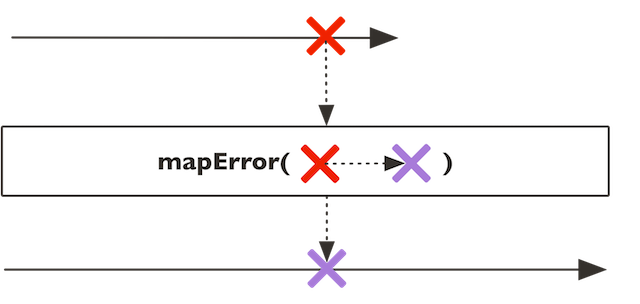
-
mapError
@Deprecated public final <E extends Throwable> Mono<T> mapError(Class<E> type, Function<? super E,? extends Throwable> mapper)
Deprecated. useonErrorMap(java.util.function.Function<? super java.lang.Throwable, ? extends java.lang.Throwable>)instead. Will be removed in 3.1.0.Transform the error emitted by thisMonoby applying a function if the error matches the given type, otherwise let the error flow.
-
mapError
@Deprecated public final Mono<T> mapError(Predicate<? super Throwable> predicate, Function<? super Throwable,? extends Throwable> mapper)
Deprecated. useonErrorMap(java.util.function.Function<? super java.lang.Throwable, ? extends java.lang.Throwable>)instead. Will be removed in 3.1.0.Transform the error emitted by thisMonoby applying a function if the error matches the given predicate, otherwise let the error flow.
-
materialize
public final Mono<Signal<T>> materialize()
Transform the incoming onNext, onError and onComplete signals intoSignal. Since the error is materialized as aSignal, the propagation will be stopped and onComplete will be emitted. Complete signal will first emit aSignal.complete()and then effectively complete the flux.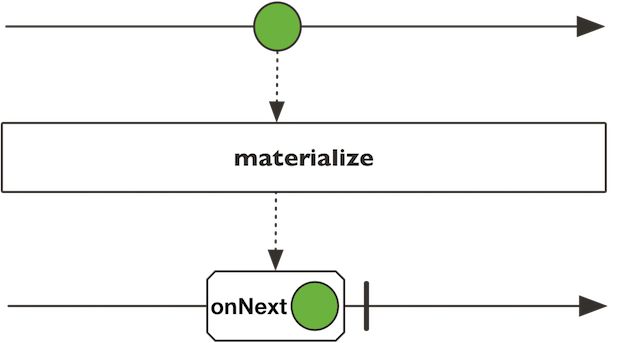
-
onErrorMap
public final Mono<T> onErrorMap(Function<? super Throwable,? extends Throwable> mapper)
Transform the error emitted by thisMonoby applying a function.
-
onErrorMap
public final <E extends Throwable> Mono<T> onErrorMap(Class<E> type, Function<? super E,? extends Throwable> mapper)
Transform the error emitted by thisMonoby applying a function if the error matches the given type, otherwise let the error flow.
-
onErrorMap
public final Mono<T> onErrorMap(Predicate<? super Throwable> predicate, Function<? super Throwable,? extends Throwable> mapper)
Transform the error emitted by thisMonoby applying a function if the error matches the given predicate, otherwise let the error flow.
-
or
public final Mono<T> or(Mono<? extends T> other)
Emit the any of the result from this mono or from the given mono
- Parameters:
other- the racing otherMonoto compete with for the result- Returns:
- a new
Mono - See Also:
first(reactor.core.publisher.Mono<? extends T>...)
-
otherwise
@Deprecated public final Mono<T> otherwise(Function<? super Throwable,? extends Mono<? extends T>> fallback)
Deprecated. UseonErrorResume(Function)} instead. Will be removed in 3.1.0.Subscribe to a returned fallback publisher when any error occurs.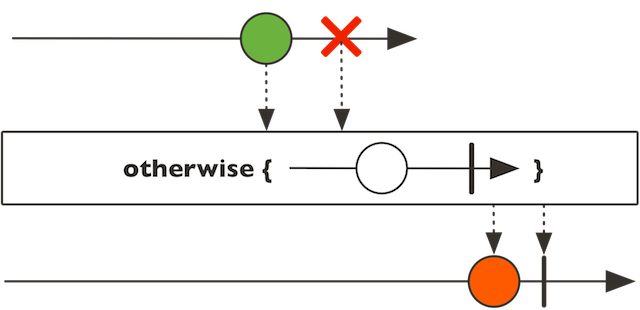
-
otherwise
@Deprecated public final <E extends Throwable> Mono<T> otherwise(Class<E> type, Function<? super E,? extends Mono<? extends T>> fallback)
Deprecated. UseonErrorResume(Class, Function)instead. Will be removed in 3.1.0.Subscribe to a returned fallback publisher when an error matching the given type occurs.
-
otherwise
@Deprecated public final Mono<T> otherwise(Predicate<? super Throwable> predicate, Function<? super Throwable,? extends Mono<? extends T>> fallback)
Deprecated. UseonErrorResume(Predicate, Function)instead. Will be removed in 3.1.0.Subscribe to a returned fallback publisher when an error matching the given type occurs.
-
otherwiseIfEmpty
@Deprecated public final Mono<T> otherwiseIfEmpty(Mono<? extends T> alternate)
Deprecated. UseswitchIfEmpty(reactor.core.publisher.Mono<? extends T>)instead. Will be removed in 3.1.0.Provide an alternativeMonoif this mono is completed without data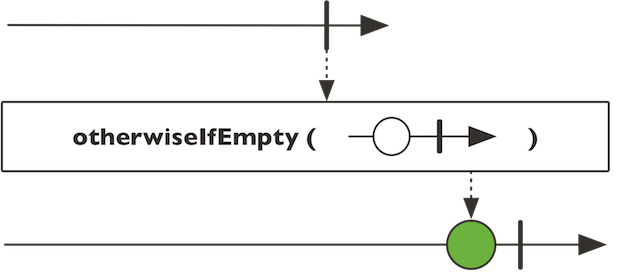
- Parameters:
alternate- the alternate mono if this mono is empty- Returns:
- an alternating
Monoon source onComplete without elements
-
otherwiseReturn
@Deprecated public final Mono<T> otherwiseReturn(T fallback)
Deprecated. useonErrorReturn(Object)instead. Will be removed in 3.1.0.Subscribe to a returned fallback value when any error occurs.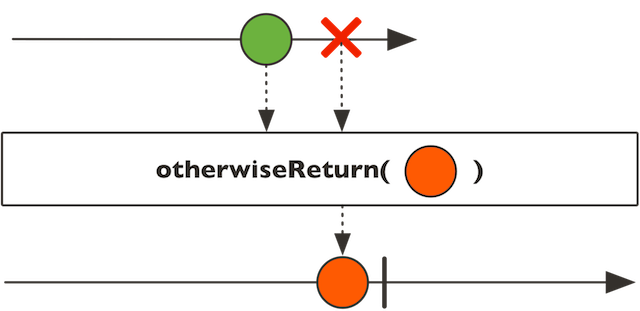
- Parameters:
fallback- the value to emit if an error occurs- Returns:
- a new
Mono
-
otherwiseReturn
@Deprecated public final <E extends Throwable> Mono<T> otherwiseReturn(Class<E> type, T fallbackValue)
Deprecated. useonErrorReturn(Class, Object)instead. Will be removed in 3.1.0.Fallback to the given value if an error of a given type is observed on thisMono
- Type Parameters:
E- the error type- Parameters:
type- the error type to matchfallbackValue- alternate value on fallback- Returns:
- a new
Mono
-
otherwiseReturn
@Deprecated public final <E extends Throwable> Mono<T> otherwiseReturn(Predicate<? super Throwable> predicate, T fallbackValue)
Deprecated. useonErrorReturn(Predicate, Object)instead. Will be removed in 3.1.0.Fallback to the given value if an error matching the given predicate is observed on thisMono
- Type Parameters:
E- the error type- Parameters:
predicate- the error predicate to matchfallbackValue- alternate value on fallback- Returns:
- a new
Mono
-
onTerminateDetach
public final Mono<T> onTerminateDetach()
Detaches the both the childSubscriberand theSubscriptionon termination or cancellation.This should help with odd retention scenarios when running with non-reactor
Subscriber.- Returns:
- a detachable
Mono
-
publish
public final <R> Mono<R> publish(Function<? super Mono<T>,? extends Mono<? extends R>> transform)
Shares aMonofor the duration of a function that may transform it and consume it as many times as necessary without causing multiple subscriptions to the upstream.- Type Parameters:
R- the output value type- Parameters:
transform- the tranformation function- Returns:
- a new
Mono
-
publishOn
public final Mono<T> publishOn(Scheduler scheduler)
Run onNext, onComplete and onError on a suppliedScheduler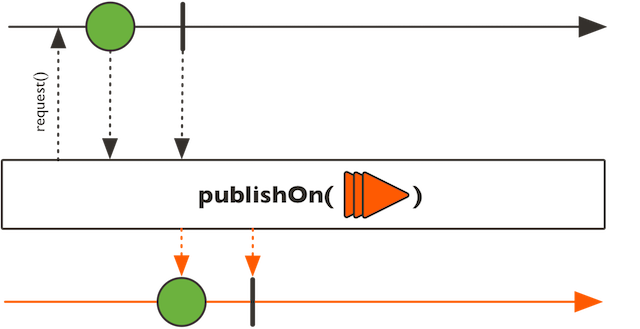
Typically used for fast publisher, slow consumer(s) scenarios.
mono.publishOn(Schedulers.single()).subscribe()- Parameters:
scheduler- a checkedScheduler.Workerfactory- Returns:
- an asynchronously producing
Mono
-
repeat
public final Flux<T> repeat()
Repeatedly subscribe to the source completion of the previous subscription.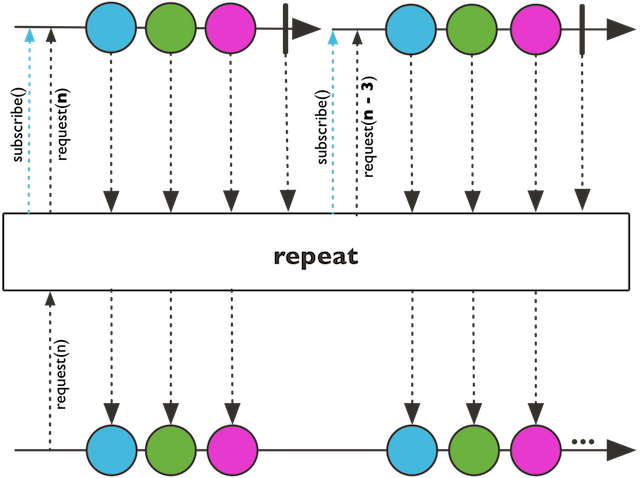
- Returns:
- an indefinitively repeated
Fluxon onComplete
-
repeat
public final Flux<T> repeat(BooleanSupplier predicate)
Repeatedly subscribe to the source if the predicate returns true after completion of the previous subscription.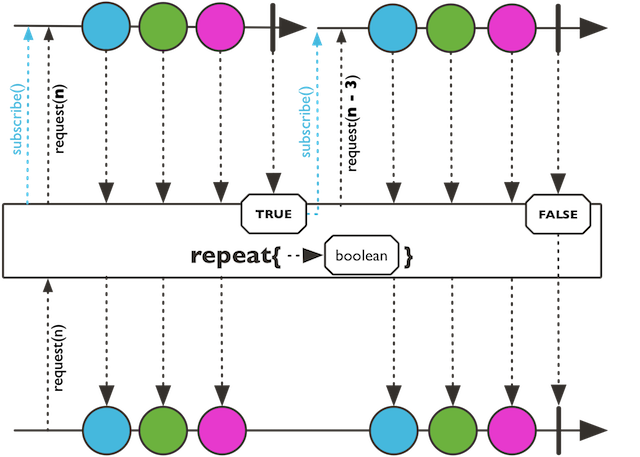
- Parameters:
predicate- the boolean to evaluate on onComplete.- Returns:
- an eventually repeated
Fluxon onComplete
-
repeat
public final Flux<T> repeat(long numRepeat)
Repeatedly subscribe to the source if the predicate returns true after completion of the previous subscription.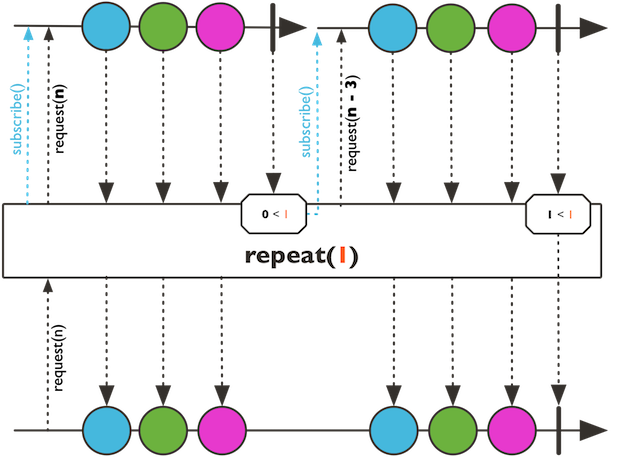
- Parameters:
numRepeat- the number of times to re-subscribe on onComplete- Returns:
- an eventually repeated
Fluxon onComplete up to number of repeat specified
-
repeat
public final Flux<T> repeat(long numRepeat, BooleanSupplier predicate)
Repeatedly subscribe to the source if the predicate returns true after completion of the previous subscription. A specified maximum of repeat will limit the number of re-subscribe.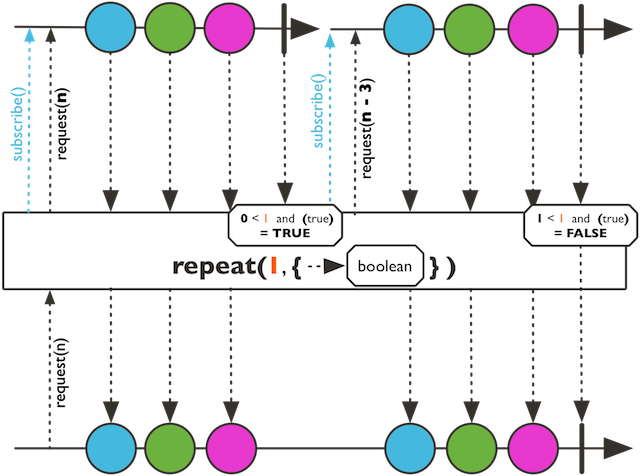
- Parameters:
numRepeat- the number of times to re-subscribe on completepredicate- the boolean to evaluate on onComplete- Returns:
- an eventually repeated
Fluxon onComplete up to number of repeat specified OR matching predicate
-
repeatWhen
public final Flux<T> repeatWhen(Function<Flux<Long>,? extends Publisher<?>> whenFactory)
Repeatedly subscribe to thisMonowhen a companion sequence signals a number of emitted elements in response to the flux completion signal.If the companion sequence signals when this
Monois active, the repeat attempt is suppressed and any terminal signal will terminate thisFluxwith the same signal immediately.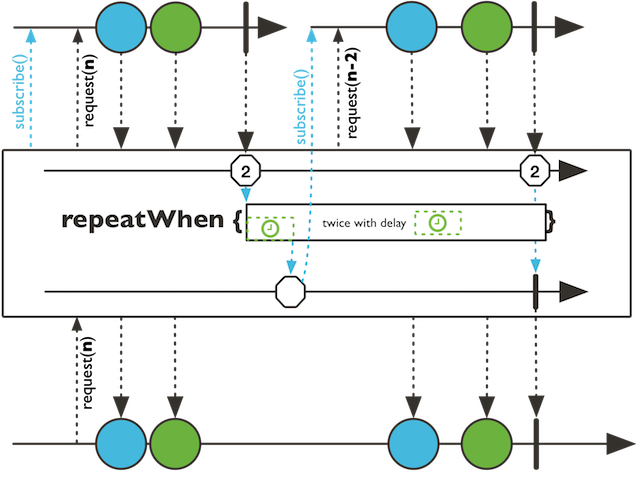
-
repeatWhenEmpty
public final Mono<T> repeatWhenEmpty(Function<Flux<Long>,? extends Publisher<?>> repeatFactory)
Repeatedly subscribe to thisMonountil there is an onNext signal when a companion sequence signals a number of emitted elements.If the companion sequence signals when this
Monois active, the repeat attempt is suppressed and any terminal signal will terminate thisMonowith the same signal immediately.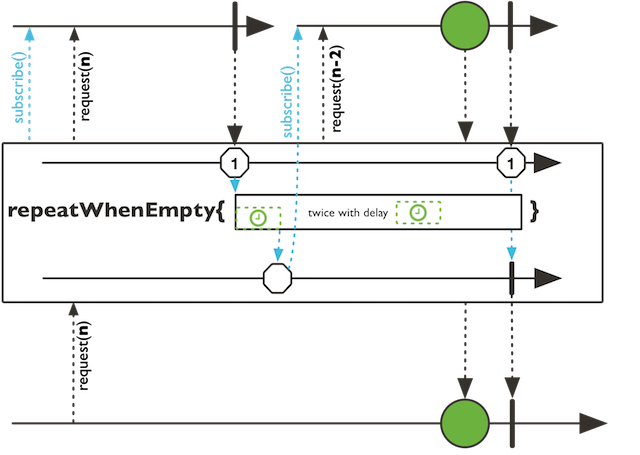
-
repeatWhenEmpty
public final Mono<T> repeatWhenEmpty(int maxRepeat, Function<Flux<Long>,? extends Publisher<?>> repeatFactory)
Repeatedly subscribe to thisMonountil there is an onNext signal when a companion sequence signals a number of emitted elements.If the companion sequence signals when this
Monois active, the repeat attempt is suppressed and any terminal signal will terminate thisMonowith the same signal immediately.Emits an
IllegalStateExceptionif the max repeat is exceeded and different fromInteger.MAX_VALUE.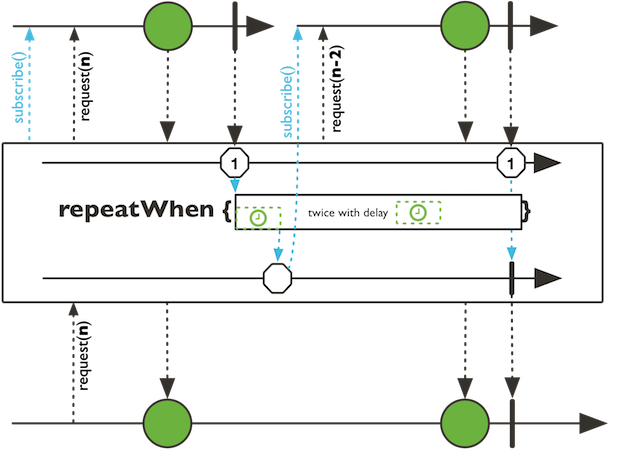
- Parameters:
maxRepeat- the maximum repeat number of time (infinite ifInteger.MAX_VALUE)repeatFactory- theFunctionproviding aFluxsignalling the current repeat index from 0 on onComplete and returning aPublishercompanion.- Returns:
- an eventually repeated
Monoon onComplete when the companionPublisherproduces an onNext signal
-
retry
public final Mono<T> retry()
Re-subscribes to thisMonosequence if it signals any error either indefinitely.The times == Long.MAX_VALUE is treated as infinite retry.
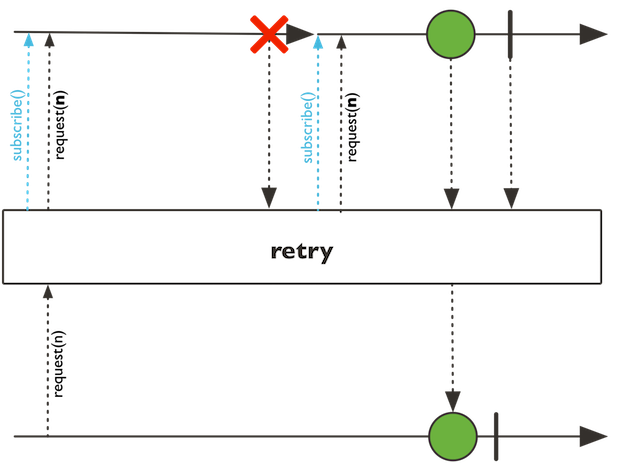
- Returns:
- a re-subscribing
Monoon onError
-
retry
public final Mono<T> retry(long numRetries)
Re-subscribes to thisMonosequence if it signals any error either indefinitely or a fixed number of times.The times == Long.MAX_VALUE is treated as infinite retry.
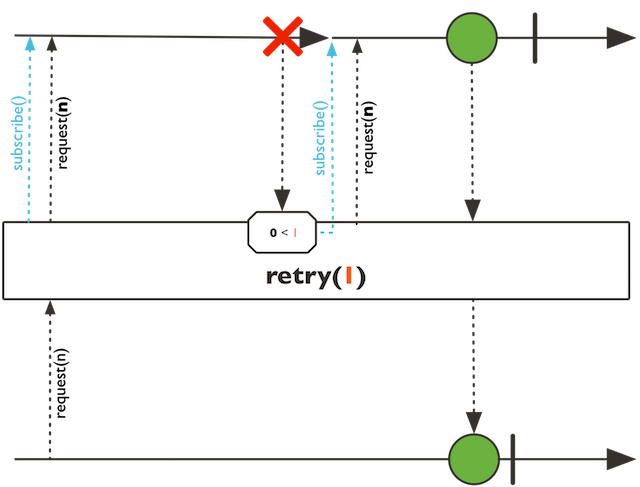
- Parameters:
numRetries- the number of times to tolerate an error- Returns:
- a re-subscribing
Monoon onError up to the specified number of retries.
-
retry
public final Mono<T> retry(Predicate<Throwable> retryMatcher)
Re-subscribes to thisMonosequence if it signals any error and the givenPredicatematches otherwise push the error downstream.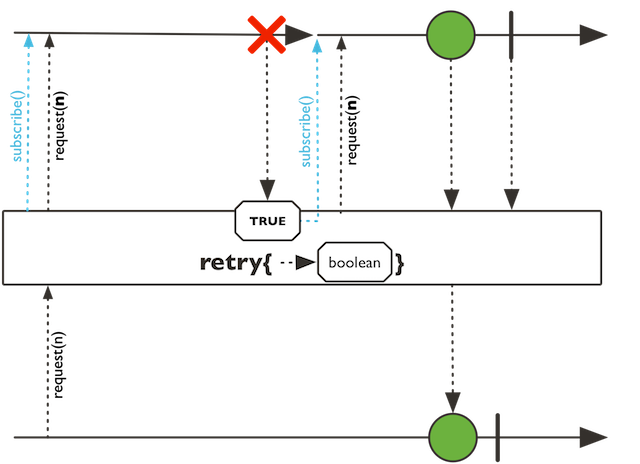
- Parameters:
retryMatcher- the predicate to evaluate if retry should occur based on a given error signal- Returns:
- a re-subscribing
Monoon onError if the predicates matches.
-
retry
public final Mono<T> retry(long numRetries, Predicate<Throwable> retryMatcher)
Re-subscribes to thisMonosequence up to the specified number of retries if it signals any error and the givenPredicatematches otherwise push the error downstream.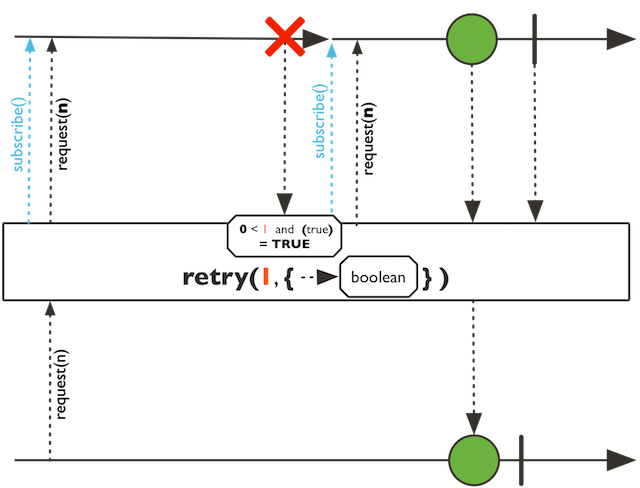
- Parameters:
numRetries- the number of times to tolerate an errorretryMatcher- the predicate to evaluate if retry should occur based on a given error signal- Returns:
- a re-subscribing
Monoon onError up to the specified number of retries and if the predicate matches.
-
retryWhen
public final Mono<T> retryWhen(Function<Flux<Throwable>,? extends Publisher<?>> whenFactory)
-
subscribe
public final MonoProcessor<T> subscribe()
Start the chain and request unbounded demand.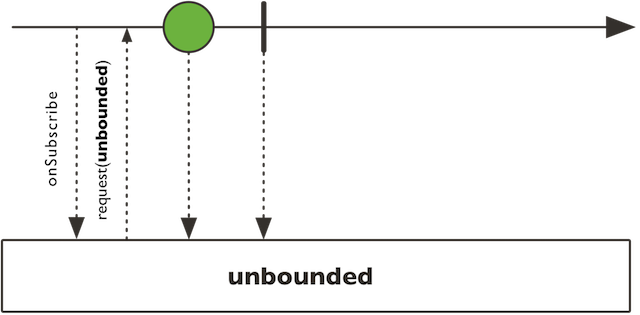
- Returns:
- a
Runnabletask to execute to dispose and cancel the underlyingSubscription
-
subscribe
public final Disposable subscribe(Consumer<? super T> consumer)
Subscribe aConsumerto thisMonothat will consume all the sequence.For a passive version that observe and forward incoming data see
doOnSuccess(Consumer)anddoOnError(java.util.function.Consumer).
- Parameters:
consumer- the consumer to invoke on each value- Returns:
- a new
Runnableto dispose theSubscription
-
subscribe
public final Disposable subscribe(Consumer<? super T> consumer, Consumer<? super Throwable> errorConsumer)
SubscribeConsumerto thisMonothat will consume all the sequence.For a passive version that observe and forward incoming data see
doOnSuccess(Consumer)anddoOnError(java.util.function.Consumer).
- Parameters:
consumer- the consumer to invoke on each next signalerrorConsumer- the consumer to invoke on error signal- Returns:
- a new
Runnableto dispose theSubscription
-
subscribe
public final Disposable subscribe(Consumer<? super T> consumer, Consumer<? super Throwable> errorConsumer, Runnable completeConsumer)
SubscribeConsumerto thisMonothat will consume all the sequence.For a passive version that observe and forward incoming data see
doOnSuccess(Consumer)anddoOnError(java.util.function.Consumer).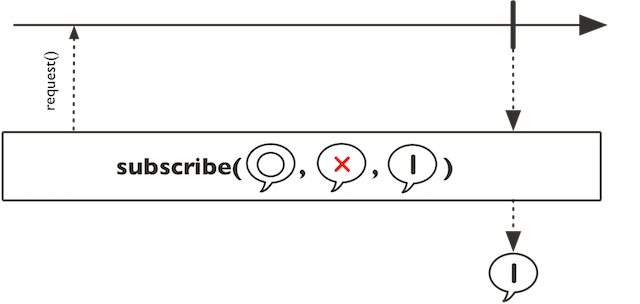
- Parameters:
consumer- the consumer to invoke on each valueerrorConsumer- the consumer to invoke on error signalcompleteConsumer- the consumer to invoke on complete signal- Returns:
- a new
Disposableto dispose theSubscription
-
subscribe
public final Disposable subscribe(Consumer<? super T> consumer, Consumer<? super Throwable> errorConsumer, Runnable completeConsumer, Consumer<? super Subscription> subscriptionConsumer)
SubscribeConsumerto thisMonothat will consume all the sequence.For a passive version that observe and forward incoming data see
doOnSuccess(Consumer)anddoOnError(java.util.function.Consumer).
- Parameters:
consumer- the consumer to invoke on each valueerrorConsumer- the consumer to invoke on error signalcompleteConsumer- the consumer to invoke on complete signalsubscriptionConsumer- the consumer to invoke on subscribe signal, to be used for the initialrequest, or null for max request- Returns:
- a new
Disposableto dispose theSubscription
-
subscribeOn
public final Mono<T> subscribeOn(Scheduler scheduler)
Run the requests to this PublisherMonoon a given worker assigned by the suppliedScheduler.mono.subscribeOn(Schedulers.parallel()).subscribe())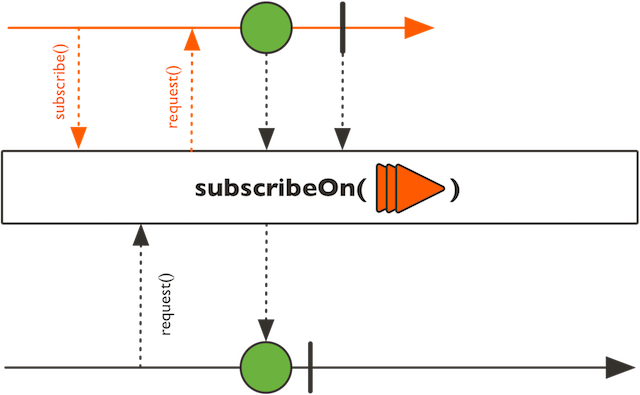
- Parameters:
scheduler- a checkedScheduler.Workerfactory- Returns:
- an asynchronously requesting
Mono
-
subscribeWith
public final <E extends Subscriber<? super T>> E subscribeWith(E subscriber)
Subscribe theMonowith the givneSubscriberand return it.- Type Parameters:
E- the reified type of theSubscriberfor chaining- Parameters:
subscriber- theSubscriberto subscribe- Returns:
- the passed
Subscriberafter subscribing it to thisMono
-
onErrorResume
public final Mono<T> onErrorResume(Function<? super Throwable,? extends Mono<? extends T>> fallback)
Subscribe to a returned fallback publisher when any error occurs.
- Parameters:
fallback- the function to map an alternativeMono- Returns:
- an alternating
Monoon source onError - See Also:
Flux.onErrorResume(java.util.function.Function<? super java.lang.Throwable, ? extends org.reactivestreams.Publisher<? extends T>>)
-
onErrorResume
public final <E extends Throwable> Mono<T> onErrorResume(Class<E> type, Function<? super E,? extends Mono<? extends T>> fallback)
Subscribe to a returned fallback publisher when an error matching the given type occurs.
- Type Parameters:
E- the error type- Parameters:
type- the error type to matchfallback- theFunctionmapping the error to a newMonosequence- Returns:
- a new
Mono - See Also:
Flux.onErrorResume(java.util.function.Function<? super java.lang.Throwable, ? extends org.reactivestreams.Publisher<? extends T>>)
-
onErrorResume
public final Mono<T> onErrorResume(Predicate<? super Throwable> predicate, Function<? super Throwable,? extends Mono<? extends T>> fallback)
$ * Subscribe to a returned fallback publisher when an error matching the given predicate occurs.
- Parameters:
predicate- the error predicate to matchfallback- theFunctionmapping the error to a newMonosequence- Returns:
- a new
Mono - See Also:
Flux.onErrorResume(java.util.function.Function<? super java.lang.Throwable, ? extends org.reactivestreams.Publisher<? extends T>>)
-
onErrorReturn
public final Mono<T> onErrorReturn(T fallback)
Simply emit a captured fallback value when any error is observed on thisMono.
- Parameters:
fallback- the value to emit if an error occurs- Returns:
- a new falling back
Mono
-
onErrorReturn
public final <E extends Throwable> Mono<T> onErrorReturn(Class<E> type, T fallbackValue)
Simply emit a captured fallback value when an error of the specified type is observed on thisMono.
- Type Parameters:
E- the error type- Parameters:
type- the error type to matchfallbackValue- the value to emit if a matching error occurs- Returns:
- a new falling back
Mono
-
onErrorReturn
public final <E extends Throwable> Mono<T> onErrorReturn(Predicate<? super Throwable> predicate, T fallbackValue)
Simply emit a captured fallback value when an error matching the given predicate is observed on thisMono.
- Type Parameters:
E- the error type- Parameters:
predicate- the error predicate to matchfallbackValue- the value to emit if a matching error occurs- Returns:
- a new
Mono
-
switchIfEmpty
public final Mono<T> switchIfEmpty(Mono<? extends T> alternate)
Provide an alternativeMonoif this mono is completed without data
- Parameters:
alternate- the alternate mono if this mono is empty- Returns:
- an alternating
Monoon source onComplete without elements - See Also:
Flux.switchIfEmpty(org.reactivestreams.Publisher<? extends T>)
-
then
public final <R> Mono<R> then(Function<? super T,? extends Mono<? extends R>> transformer)
- Type Parameters:
R- the result type bound- Parameters:
transformer- the function to dynamically bind a newMono- Returns:
- a new
Monocontaining the merged values - API Note:
- in 3.1.0.M1 this method will be renamed `flatMap`. However, until
then the behavior of
flatMap(Function)remains the current one, so it is not yet possible to anticipate this migration.
-
then
public final <V> Mono<V> then(Mono<V> other)
Ignore element from thisMonoand transform its completion signal into the emission and completion signal of a providedMono<V>. Error signal is replayed in the resultingMono<V>.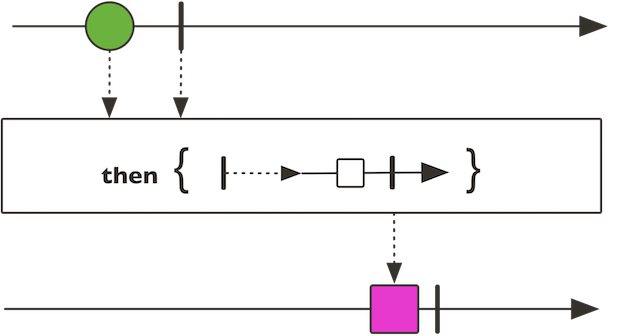
-
then
@Deprecated public final <V> Mono<V> then(Supplier<? extends Mono<V>> sourceSupplier)
Deprecated. removed in 3.1, usethen(Mono)withdefer(java.util.function.Supplier<? extends reactor.core.publisher.Mono<? extends T>>). The competing overload was causing confusion and the generic was not symmetric withthen(Mono).Ignore element from thisMonoand transform its completion signal into the emission and completion signal of a suppliedMono<V>. Error signal is replayed in the resultingMono<V>.
-
thenEmpty
public final Mono<Void> thenEmpty(Publisher<Void> other)
Return aMono<Void>that waits for thisMonoto complete then for a suppliedPublisher<Void>to also complete. The second completion signal is replayed, or any error signal that occurs instead.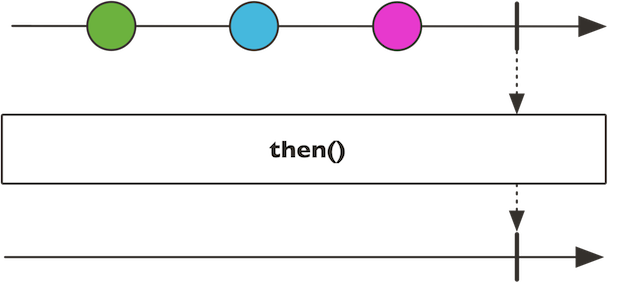
-
thenMany
public final <V> Flux<V> thenMany(Publisher<V> other)
Ignore element from this mono and transform the completion signal into aFlux<V>that will emit elements from the providedPublisher.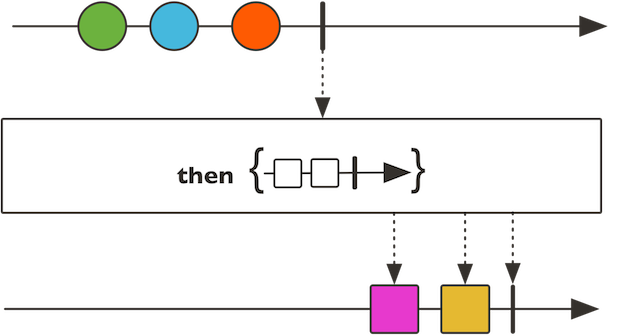
-
thenMany
@Deprecated public final <V> Flux<V> thenMany(Supplier<? extends Publisher<V>> afterSupplier)
Deprecated. removed in 3.1, usethenMany(Publisher)withdefer(java.util.function.Supplier<? extends reactor.core.publisher.Mono<? extends T>>). The competing overload was called unnecessary by extended feedback and aligns with removing of Supplier of Publisher aliases elsewhere.Ignore element from this mono and transform the completion signal into aFlux<V>that will emit elements from the supplier-providedPublisher.
-
timeout
public final Mono<T> timeout(Duration timeout)
Signal aTimeoutExceptionin case an item doesn't arrive before the given period.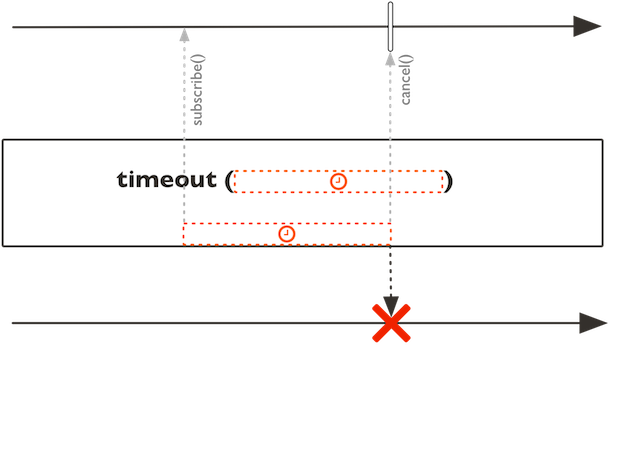
-
timeout
public final Mono<T> timeout(Duration timeout, Mono<? extends T> fallback)
Switch to a fallbackMonoin case an item doesn't arrive before the given period.If the given
Publisheris null, signal aTimeoutException.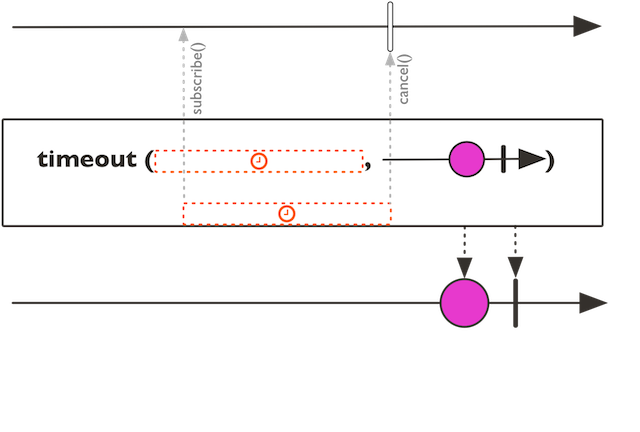
-
timeout
public final Mono<T> timeout(Duration timeout, Scheduler timer)
Signal aTimeoutExceptionerror in case an item doesn't arrive before the given period.
-
timeout
public final Mono<T> timeout(Duration timeout, Mono<? extends T> fallback, Scheduler timer)
Switch to a fallbackMonoin case an item doesn't arrive before the given period.If the given
Publisheris null, signal aTimeoutException.
-
timeout
public final <U> Mono<T> timeout(Publisher<U> firstTimeout)
Signal aTimeoutExceptionin case the item from thisMonohas not been emitted before the givenPublisheremits.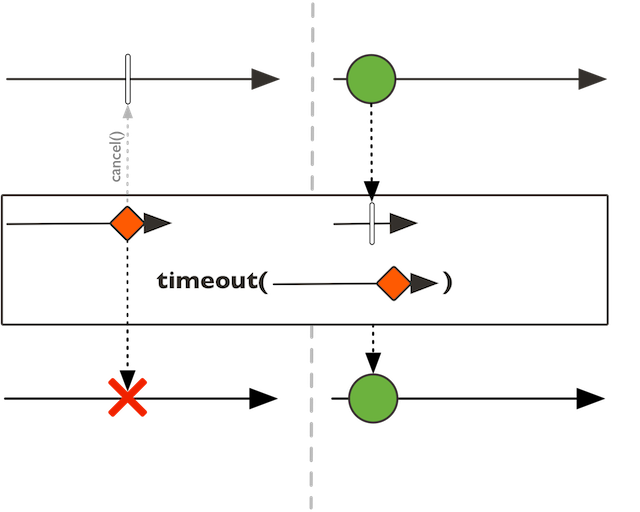
-
timeout
public final <U> Mono<T> timeout(Publisher<U> firstTimeout, Mono<? extends T> fallback)
Switch to a fallbackPublisherin case the item from thisMonohas not been emitted before the givenPublisheremits. The following items will be individually timed via the factory providedPublisher.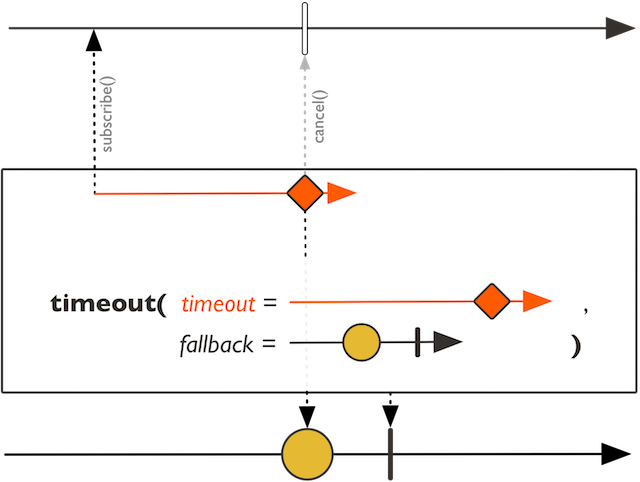
- Type Parameters:
U- the element type of the timeout Publisher- Parameters:
firstTimeout- the timeoutPublisherthat must not emit before the first signal from thisMonofallback- the fallbackPublisherto subscribe when a timeout occurs- Returns:
- a first then per-item expirable
Monowith a fallbackPublisher
-
timeoutMillis
@Deprecated public final Mono<T> timeoutMillis(long timeout)
Deprecated. use theDurationbased variants instead, will be removed in 3.1.0Signal aTimeoutExceptionerror in case an item doesn't arrive before the given period.
-
timeoutMillis
@Deprecated public final Mono<T> timeoutMillis(long timeout, TimedScheduler timer)
Deprecated. use theDurationbased variants instead, will be removed in 3.1.0Signal aTimeoutExceptionerror in case an item doesn't arrive before the given period.
-
timeoutMillis
@Deprecated public final Mono<T> timeoutMillis(long timeout, Mono<? extends T> fallback)
Deprecated. use theDurationbased variants instead, will be removed in 3.1.0Switch to a fallbackMonoin case an item doesn't arrive before the given period.If the given
Publisheris null, signal aTimeoutException.
-
timeoutMillis
@Deprecated public final Mono<T> timeoutMillis(long timeout, Mono<? extends T> fallback, TimedScheduler timer)
Deprecated. use theDurationbased variants instead, will be removed in 3.1.0Switch to a fallbackMonoin case an item doesn't arrive before the given period.If the given
Publisheris null, signal aTimeoutException.
-
timestamp
public final Mono<Tuple2<Long,T>> timestamp()
Emit aTuple2pair of T1Longcurrent system time in millis and T2Tassociated data for the eventual item from thisMono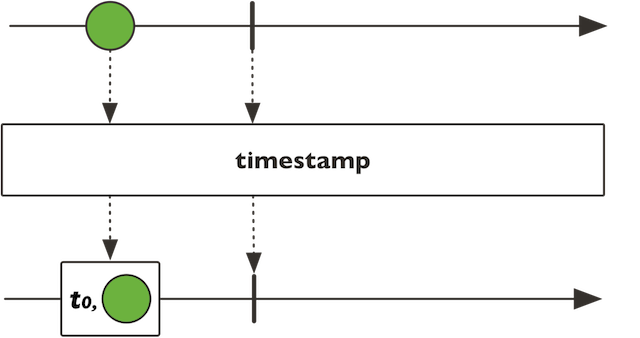
- Returns:
- a timestamped
Mono
-
timestamp
@Deprecated public final Mono<Tuple2<Long,T>> timestamp(TimedScheduler scheduler)
Deprecated. usetimestamp(Scheduler)
-
toFuture
public final CompletableFuture<T> toFuture()
Transform thisMonointo aCompletableFuturecompleting on onNext or onComplete and failing on onError.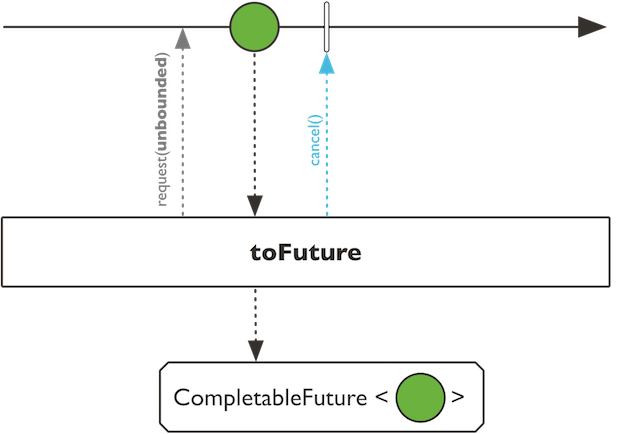
- Returns:
- a
CompletableFuture
-
transform
public final <V> Mono<V> transform(Function<? super Mono<T>,? extends Publisher<V>> transformer)
Transform thisMonoin order to generate a targetMono. Unlikecompose(Function), the provided function is executed as part of assembly.Function<Mono, Mono> applySchedulers = mono -> mono.subscribeOn(Schedulers.io()).publishOn(Schedulers.parallel()); mono.transform(applySchedulers).map(v -> v * v).subscribe()- Type Parameters:
V- the item type in the returnedMono- Parameters:
transformer- theFunctionto immediately map thisMonointo a targetMonoinstance.- Returns:
- a new
Mono - See Also:
for deferred composition of {@link Mono} for each {@link Subscriber},for a loose conversion to an arbitrary type
-
onAssembly
protected static <T> Mono<T> onAssembly(Mono<T> source)
- Type Parameters:
T- the value type- Parameters:
source- the source to wrap- Returns:
- the potentially wrapped source
-
-
